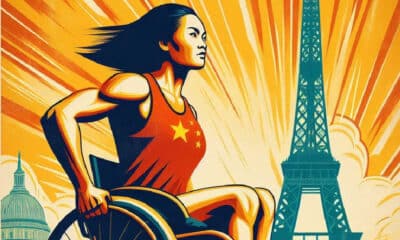China Arts & Entertainment
Chunwan 2022: The CMG Spring Festival Gala Liveblog by What’s on Weibo
Published
3 years agoon
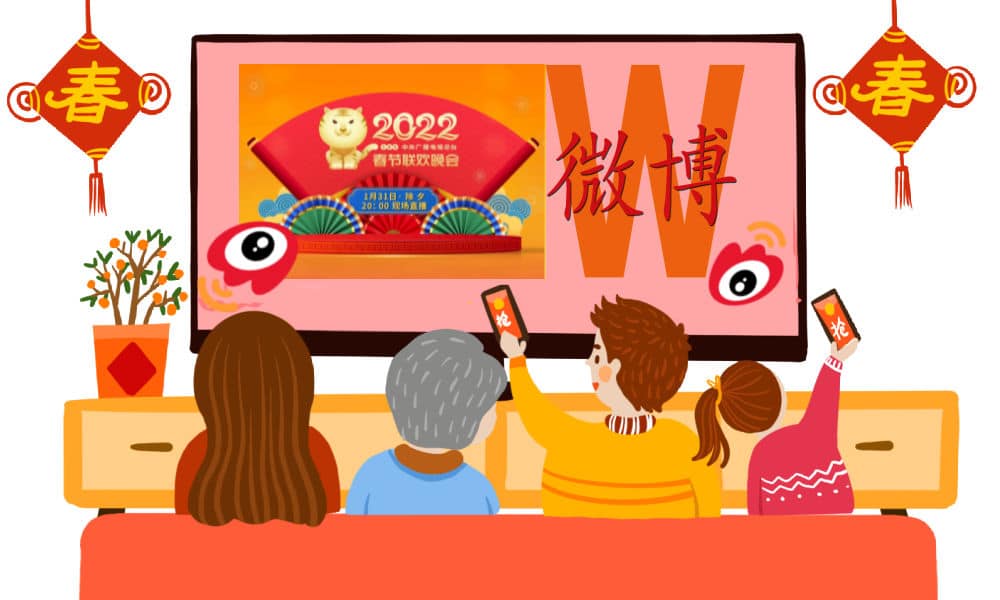
PREMIUM CONTENT
As we are leaving the Year of the Ox and entering Year of the Tiger, it’s time for the 40th edition of the Spring Festival Gala! Watch the Gala together with What’s on Weibo here and follow our liveblog to keep up with what’s happening on screen and on social media (this liveblog has now closed, read the overview below!) [Premium content]
Another year has flown by and despite many changes, we can always count on China’s annual Spring Festival Gala. This 40th edition of the festival is the third one to take place in the Covid era.
The Gala will be broadcast on TV and live-streamed via various channels on January 31st, 20.00 pm China Standard Time. So turn on your TV and tune into CCTV, live stream from Weibo, watch on YouTube, or head to the CCTV website. We will be live-blogging on this page here and you can scroll & watch at the same time from this page.
Very Brief Introduction to the Spring Festival Gala
China’s Spring Festival Gala (中国中央电视台春节联欢晚会), commonly abbreviated to chūnwǎn (春晚), is the annual TV gala celebrating the start of the new year. Broadcasted since 1983, it is not just the biggest live televised event in China, it is even among the most-watched shows in the world. The show reached a record 1.27 billion viewers around the globe in 2021.
Previously known as the ‘CCTV Gala,’ it is officially presented as the ‘CMG Spring Festival Gala’ since 2020: it is hosted by China Media Group (CMG), the predominant state media company founded in 2018 that holds China Central Television, China National Radio, and China Radio International.
The Gala is an important Chinese media moment and significant cultural event organized and produced by the state-run broadcaster, overseen by the National Radio and Television Administration (NRTA), and aired across dozens of channels. It shows the very best of China’s mainstream entertainment and Party propaganda and is a mix of traditional culture, (digital) commerce, and politics. It is an opportunity for the Party to communicate official ideology, it is also a chance to present the nation’s top performers.1
Since recent years, it has also become a platform to showcase China’s innovative digital technologies. In 2015 the show first featured the exchange of virtual hongbao, red envelopes with money, which WeChat users could obtain while shaking their phones during specific moments in the show. Such marketing strategies have drawn in much younger viewer audiences than before. In 2021, the Gala explicitly presented itself as a “tech innovation event” by using 8K ultra high-tech definition video and AI+VR studio technologies and super high definition cloud communication technology to coordinate performances on stage.
The show lasts a total of four hours, from 8pm to 1am Beijing time, and usually has around 30-40 different acts, from dance to singing and acrobatics. The acts that are both most-loved and most-dreaded are the comic sketches (小品) and crosstalk (相声); they are usually the funniest, but also convey the most political messages.
As viewer ratings of the Gala in the 21st century have skyrocketed, so has the critique on the show – which seems to be growing year on year. According to many viewers, the spectacle generally is often “way too political” with its display of communist nostalgia, including the performance of different revolutionary songs such as “Without the Communist Party, There is No New China” (没有共产党就没有新中国).
For this same reason, the sentence “There’ll never be a worst, just worse than last year” (“央视春晚,没有最烂,只有更烂”) has become a well-known idiom connected to the Gala.
If you want to know more about the previous editions, we also live-blogged
– 2021: The Chunwan Liveblog: Watching the 2021 CMG Spring Festival Gala
– 2020: CCTV New Year’s Gala 2020
– 2019: The CCTV Spring Festival Gala 2019 Live Blog
– 2018: CCTV Spring Festival Gala 2018 (Live Blog)
– 2017: CCTV New Year’s Gala 2017 Live Blog
– 2016: CCTV’s New Year’s Gala 2016 Liveblog
Liveblog CMG Spring Festival Gala 2022
Underneath here you will see our liveblog being updated. Leave the page open and you’ll see the new posts coming in, there should be a ‘ping’ too with every update.
Update: this liveblog is now closed, check below for an overview of the entire show.
——–
The original liveblog was done via a third-party app. The original texts and images are copied below for reference. If there are links to particular segments of the show, they have been added later. The timestamp (in Beijing time) refers to the last moment that post was updated.
Want to directly check out some Spring Festival Gala highlights on YouTube?
We recommend:
The ‘painting’ dance: ‘Only This Green (只此青绿)
The dancing elephant song: ‘The Herd Returns With Spring’ (万象回春)
Creative music, dance, poetry, and painting: “Reminiscence of the South” (忆江南)
Tai Chi up in the sky: ‘Flowing Water’ (行云流水)
The space-themed children performance: ‘Star Dreams’ (星星梦)
——–
What can we expect?
Jan 31 19:30
It’s almost time for the 40th edition of the Spring Festival Gala to begin. The fifth and final rehearsal of the entire event took place on January 29th. Even if something goes wrong tonight, the tape of the official rehearsal runs together with the live broadcast, so that in the event of a problem or disruption, the producers can seamlessly switch to the taped version without TV audiences noticing anything.
The Spring Festival Gala usually always focuses on the themes that matter to Chinese authorities, as the event is an important moment to communicate official ideology.
The themes and topics that mattered last year were China’s battle against COVID19, the 100th anniversary of the Chinese Communist Party, China’s eradication of poverty, China’s Space Program, and the upcoming Winter Olympics.
This year most of these themes will probably again also play an important role this year, together with rural revitalization and China’s unity, with a special focus on Taiwan and Hong Kong.
Also, we’re pretty sure that Olympic mascots Bing Duan Duan (“Bing Dwen Dwen”) and Xue Rong Rong (“Shuey Rhon Rhon”) will show up.
——–
Less Focus on Celebrity Culture
Jan 31 19:35
After a year of celebrities being canceled and crackdowns shaking the Chinese entertainment industry to the core, this year’s Spring Festival Gala will be less focused on popular idols of the internet era and more focused on performing art talents and national heroes.
Chinese state outlet Global Times stressed the idea that those performing in the Chinese New Year Gala should “act as a role model to viewers.”
Many of the people who have an impeccable track record are the older performing artists (those who never had to deal with the social media audiences), so the average age of the artists tonight might be a bit higher up the age ladder than usual.
——–
Most Anticipated Acts?
Jan 31 19:50
One of the most anticipated acts for tonight is the dance play “Only This Green” (只此青绿) inspired by the famous handscroll “One Thousand Miles of Rivers and Mountains.” In this performance, choreography twin stars Zhou Liya and Han Zhen will highlight the aesthetics of traditional Chinese painting.
The performance of the official Winter Olympics theme song is also attracting some attention.
Overall, the schedule of tonight’s show is looking fairly traditional, although there will be plenty of tech on display too; a 720-degree dome made of LED screens is set up for an immersive viewing experience, and the latest technology like AR, XR, and 8K will also be used.
——–
Liu Zhen: Chief Director
Jan 31 19:57
This year’s director of the Spring Festival Gala is Liu Zhen (刘真), who is the Deputy Director of the CCTV arts channel. He is known for previously directing the 2009 anniversary night of the Great Sichuan earthquake and he also directed the 2019 Spring Festival Gala themed around “New China.”
Noteworthy enough, it seems that this year’s Gala is only broadcasted from CCTV 1 Beijing Studio. Usually, there are also three or four other sub venues in other parts of China. Perhaps the Covid19 situation has been a contributing factor to deciding to let this year’s show only take place in one location.
——–
We’re starting!
Jan 31 20:05
In this opening act, Happy and Auspicious Year (欢乐吉祥年), three major Wuhan art groups are on stage together with many familiar faces, including the 87-year old actress Tao Yuling, we just saw Chinese director Zhang Yimou and acclaimed actor Ge You appearing in the intro, and there are many others together with some veteran performers who are being honored on stage today.
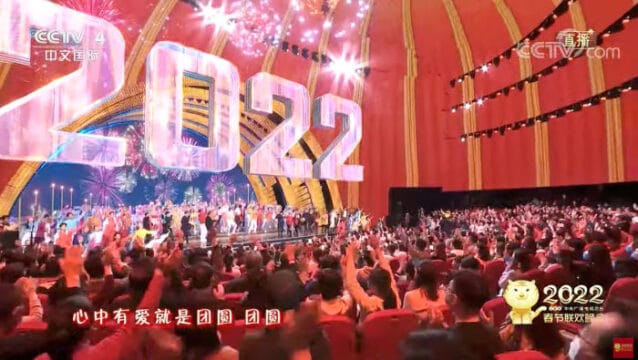
——–
Tonight’s hosts
Jan 31 20:06
These are tonight’s hosts:
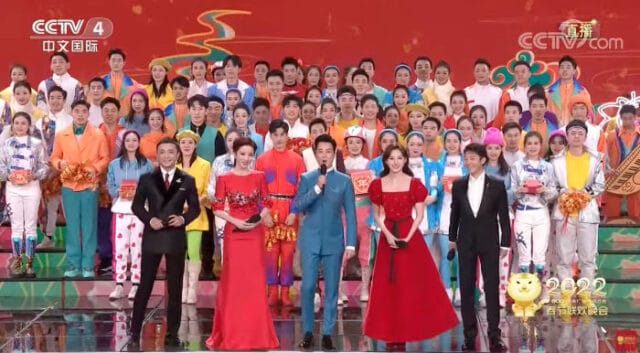
Ren Luyu (任鲁豫, 1978): Ren Luyu is a famous Chinese television host from Henan who is a very familiar face for viewers. He presented the Gala five times since 2010.
Li Sisi (李思思, 1986): Li Sisi is a Chinese television host and media personality who is actually most known for her role as host of the Gala since 2012. This is the fifth time Li Sisi is presenting the Gala. She used to be the youngest host, but this year, Ma Fanshu is taking her place as the youngest host.
Nëghmet Raxman (尼格买, 1983): Together with Ren Luyu, Raxman is known as one of the veteran Gala hosts of the past decade. This is the seventh time for him to present the event since 2015. Nëghmet Raxman is a Chinese television host, born and raised in Ürümqi, Xinjiang.
Sa Beining (撒贝宁, 1976): Also known as Benny Sa, SA Beining previously presented the Gala in 2012, 2013, 2015, and 2016. He is a Chinese television host known for his work for CCTV.
Ma Fanshu (马凡舒, 1993): Ma Fanshu is the youngest and newest host in this year’s Gala. She is a sports program host who has also been called “the most beautiful host of CCTV.”
It’s noteworthy that renowned CCTV host Zhu Jun still has not returned to the Gala. The presenter was accused of sexually assaulting an intern in 2018 and hasn’t been a host at the Gala since. Although the internet lost the sexual harassment lawsuit against Zhu Jun, he still hasn’t reappeared.
——–
Sense of the Times 时代感
Jan 31 20:10
This song is performed by the Chinese actor and singer Deng Chao (邓超) together with China’s ‘Supergirl’ Li Yuchun (李宇春) and Yi Yang Qianxi (Jackson Yee), the youngest member of the Chinese boy band TFBoys and super popular solo artist.
On stage, we also see dancer Zhang Yin (张引) together with various dance troupes.
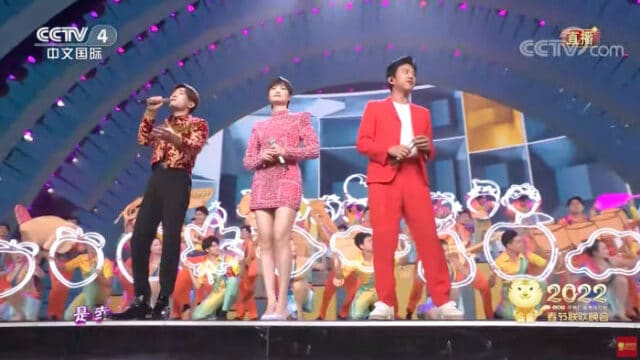
Tonight we’ll see other members of the TFBoys come up in other acts as solo artists rather than as a group.
Link to this performance here.
——–
Skit: Father and Son
Jan 31 20:15
This is the first sketch comedy or short play of the night, called xiaopin 小品 in Chinese. Traditionally, the xiaopin is the best-received type of performance of the Gala for evoking laughter among the audiences. The various xiaopin shows are filled with puns, funny lines, and plot twists to entertain the viewers.
Over recent years, these comic acts performed during the Spring Festival Gala have come to center more on social issues such as environmental protection, corruption, social morals, migrant workers, and family affairs – including those concerning love and marriage. These are not always appreciated as much by viewers.
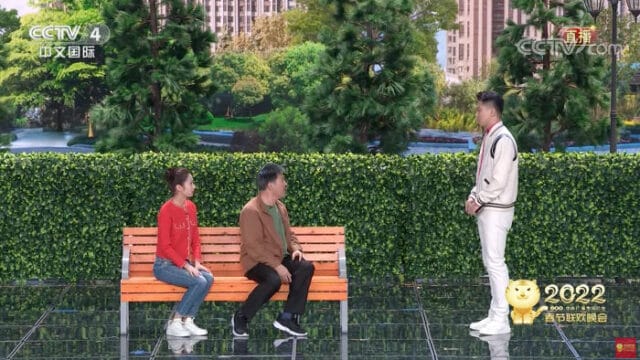
Meanwhile, on Chinese social media, some netizens are wondering who this kid is who was on stage earlier because he seemed a bit uncomfortable and awkward. But wouldn’t you too?! Over a billion people are watching this show!
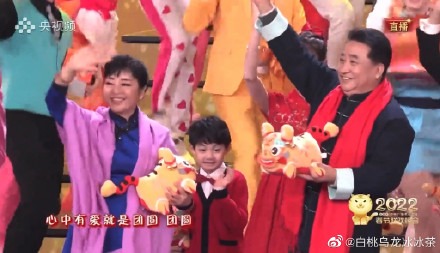
Link to this performance here.
——–
The ‘Awkward Kid’
Jan 31 20:20
Look son, you’re a meme now!
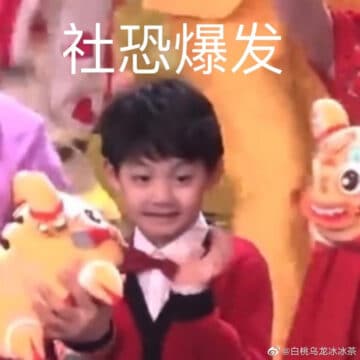
——–
Pressured by the Parents
Jan 31 20:25
Inevitably, this skit touches upon the issue of Chinese parents pressuring their kids to settle down and have kids. This is already leading to online discussions as viewers often think the Gala has skits that are insulting to women or just embarrassing. In this case, the grandpa can’t wait for a grandkid, he even thinks his future grandchild is already calling him from the womb!
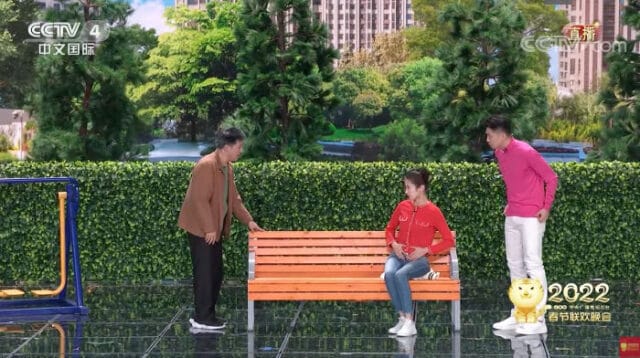
Link to this performance here.
——–
The Herd Returns With Spring
Jan 31 20:36
After the night’s first public announcement video – which was actually very well made with the tiger jumping through all the scenes -, we are now at the next segment. This is a musical skit (音乐短剧) focused on how nature blossoms with the return of spring (万象回春). It is performed by Chinese mainland singers Sha Baoliang (沙宝亮) and Wang Li (王莉) together with dancer and singer Liu Jia (刘迦).
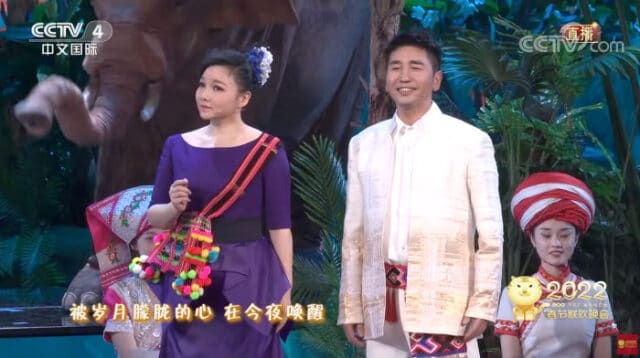
The highlight of this act is the dancing elephants. They’re not real, obviously.
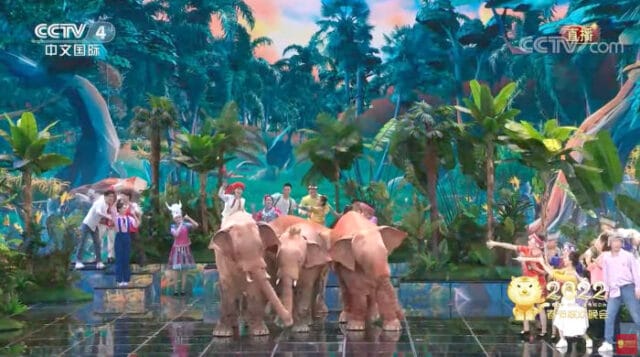
Last year, a herd of wild Asian elephants wandered hundreds of miles across southern China. They became a top trending topic on Chinese social media as netizens followed their journey. In September 2021, the elephants returned home after covering a total distance of 1,300 km.
Before tonight’s show, a creator already highlighted the elephants in the countdown program.
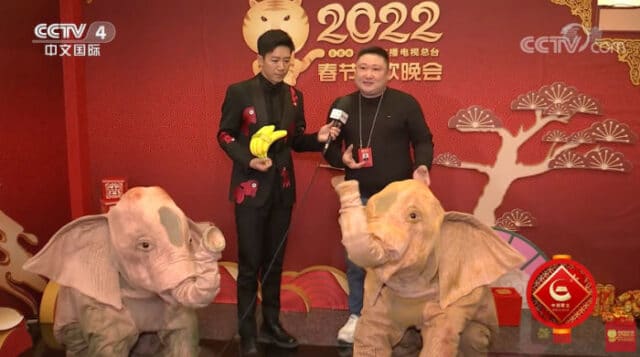
Link to this performance here.
——–
Spring Breeze
Jan 31 20:38
Chinese soprano Yin Xiumei (殷秀梅) and contemporary opera singer Yan Weiwen (阎维文) perform the song Ten Thousand Miles of Spring Wind (春风十万里), which was previously performed at the 2020 Gala by Zhang Ye (张也) and Liu Tao (刘涛).
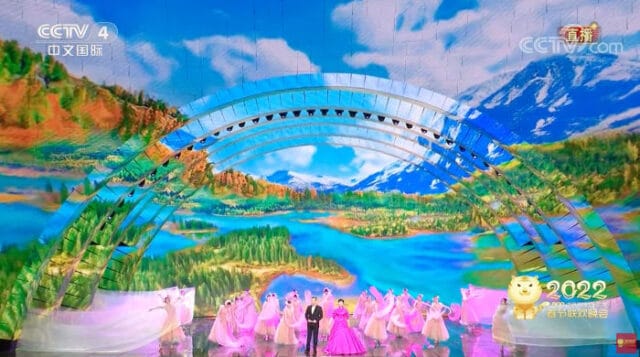
Link to this performance here.
——–
21 Weibo Accounts Suspended For ‘Ruining The Holiday Spirits’ During Lunar New Year
Jan 31 20:40
We’re seeing loads of criticism on the Gala already. Online criticism and making fun of the Gala is a big part of the ‘Chunwan Experience’ ever since the social media era. But Weibo censors might be stricter this year.
On January 22, Weibo issued an indirect warning to netizens criticizing the festive annual Chinese New Year Galas by suspending 21 Weibo users spreading negativity regarding broadcasted festival programs and their performances.
According to Weibo Management (@微博管理员), there are individual netizens who are using televised Lunar New Year celebrations to condemn and slander Chinese performers and Chinese media. In doing so, they allegedly “deliberately destruct the warm and peaceful holiday spirit.”
“In times of pandemic, the Spring Festival needs positivity and warmth,” Weibo Management stated.
——–
Comical Sketch: To Return or Not?
Jan 31 20:45
This is the sixth time for Chinese comedian Shen Teng (沈腾) and Ma Li (马丽) to be on stage together at the Spring Festival Gala. Besides that, you also might know them because Shen Teng, one of China’s top comedian actors, and the famous Ma also played together in the 2015 hit movie Goodbye Mr. Loser (夏洛特烦恼).
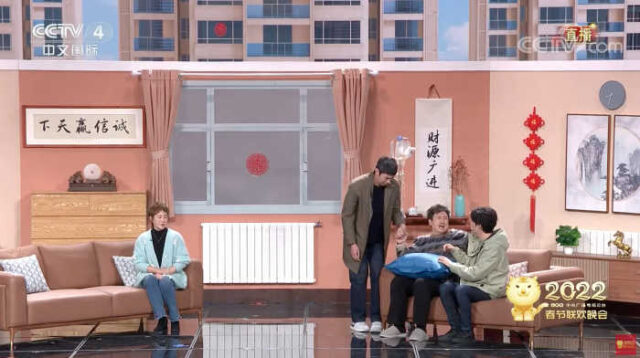
On stage with them are Chang Yuan (常远), Ai Lun 艾伦, Wang Chengsi (王成思) and Xu Wenhe (许文赫).
This act is about people who have the means to repay debts they owe but choose not to, also referred to as 老赖 (laolai). This guy is so cheap he even offers a drink of water from the heating system.
By the way, did you know you can even watch the Gala from WeChat? It seems there are more ways and channels to watch every year. The Gala already reached a record 1.27 billion viewers last year.
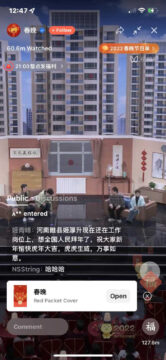
Link to this performance here.
——–
Heads Up! Only This Green (只此青绿)
Jan 31 21:04
This is a much-anticipated dance performance by Chinese star dancer Meng Qingyang (孟庆旸) together with the China Oriental Performing Arts Group. Meng also performed the dance Jasmine in last year’s Gala.
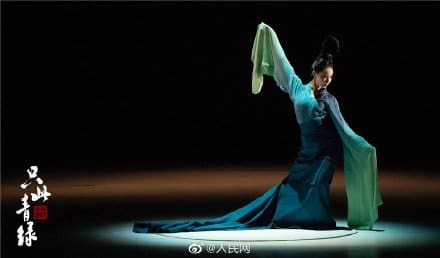
“Only This Green” (只此青绿) is inspired by the famous handscroll “One Thousand Miles of Rivers and Mountains.” In this performance, choreography twin stars Zhou Liya and Han Zhen will highlight the aesthetics of traditional Chinese painting.
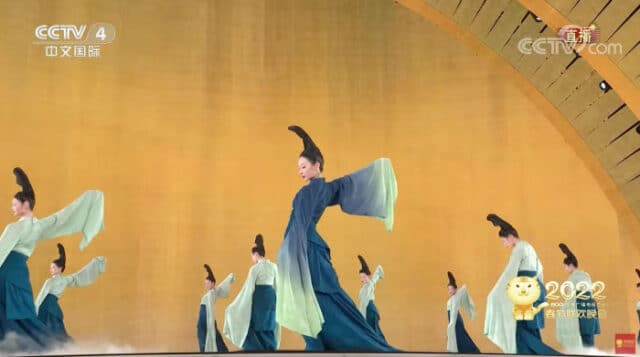
The 11.9-meter (39 ft)-long scroll A Thousand Li of Rivers and Mountains by Wang Ximeng comes from the Song Dynasty and it has been described as one of the greatest works of Chinese art. The painting is in the permanent collection of the Palace Museum in Beijing.
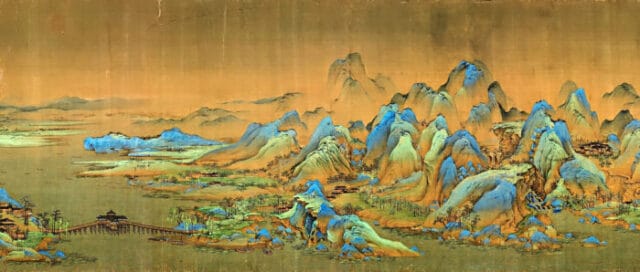
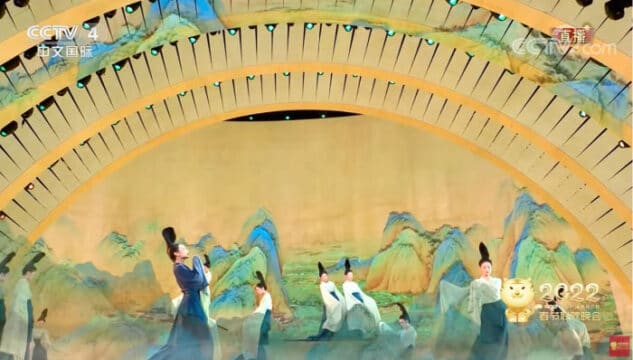
Link to this performance here.
——–
Tai Chi: “Flowing Water”
Jan 31 21:10
Chinese Olympic athlete Yang Shunhong (杨顺洪), Tai Chi World Champion Liang Bifeng (梁壁荧) and Tai Chi master Yang Dezhan (杨德战) were just featured in this impressive Tai Chi performance recorded on dazzling heights in Shanghai. (Correction > recorded from the three highest buildings in Guangzhou, Shanghai, and Chongqing!)
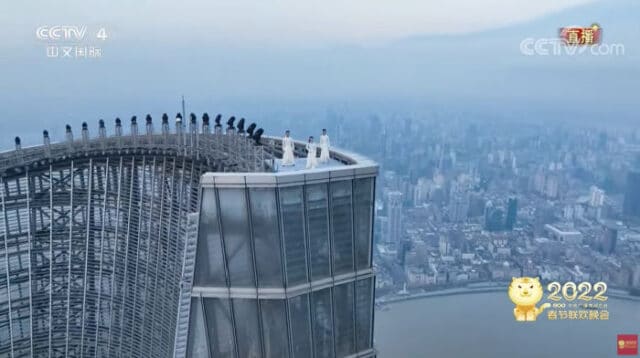
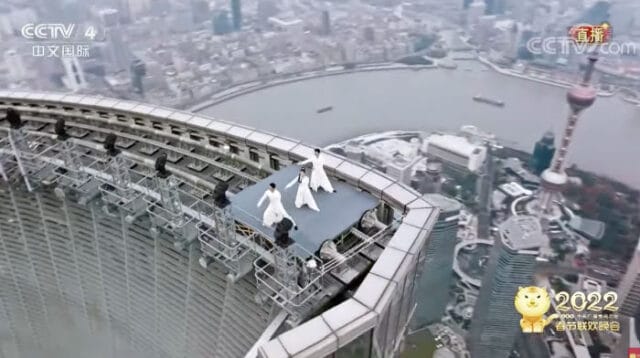
Link to video: ‘Flowing Water’ (行云流水)
——–
Chunwan Shopping
Jan 31 21:21
Over recent years, it’s become more common for e-commerce sellers to immediately jump in on the hype of what performers are wearing to sell the same or similar clothes and accessories online. In this way, viewers can watch the show while also eating and shopping, and chatting on social media at the same time!

——–
喜上加喜
Jan 31 21:23
In this comic sketch, we see Chinese comedian actress and film director Jia Ling together with award-winning actress Zhang Xiaofei. These two also worked together in the super popular 2021 movie ‘Hi, Mom‘. This time they are on stage as a mother-in-law and daughter-in-law. Since they’re both very popular, many Weibo users also said they were looking forward to seeing this sketch – especially because there was a scene in which Jia Ling, who played Zhang’s daughter in the movie, said: “Next life, let me be your mother.”
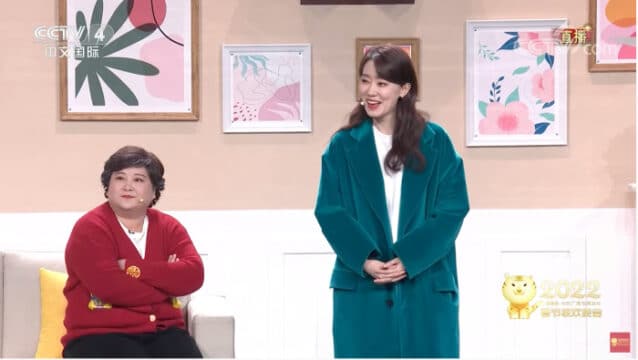
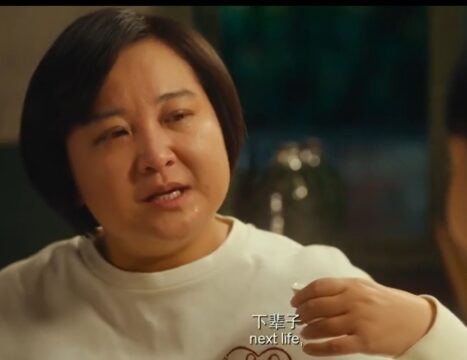
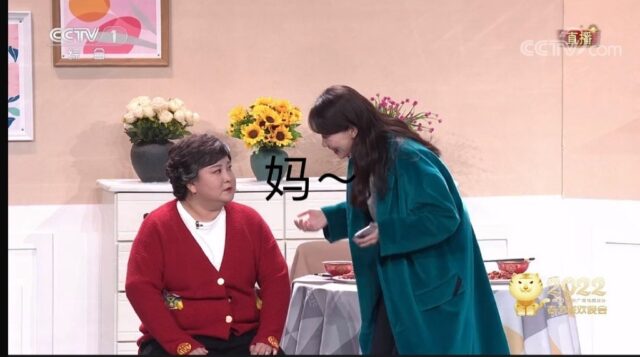
Meanwhile, some on social media are wondering if Jia is wearing the same outfit every year.

Link to this performance here.
——–
Uhm…
Jan 31 21:29
Some very quick viewers were able to capture Chinese actor Chen Baoguo (陈宝国) picking his nose with his mask on while sitting in the audience.
By the way, this is the second year the audience is wearing a face mask. In 2020, when Wuhan was first facing the Covid19 outbreak, the audience was not wearing face masks yet. 2021 was the first year.

——–
Here’s Han Hong Again
Jan 31 21:33
Singer Han Hong (1971) is one of China’s most famous pop singers and she is a regular at the Spring Festival Gala. For decades, the singer of mixed Tibetan and Han ethnicity was a member of a performing arts troupe within the People’s Liberation Army.
Tonight, she is singing the song So Many People in This World (这世界那么多人). She seemed to have some tears streaming down her face during her performance.
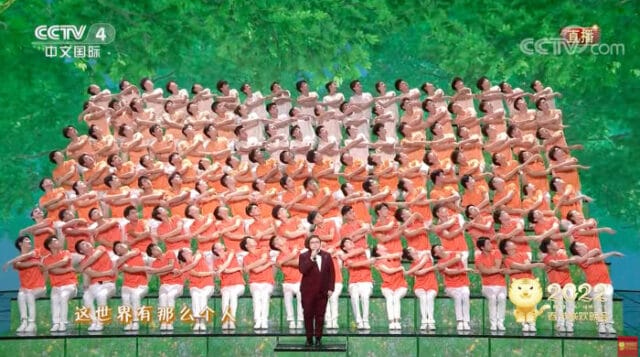
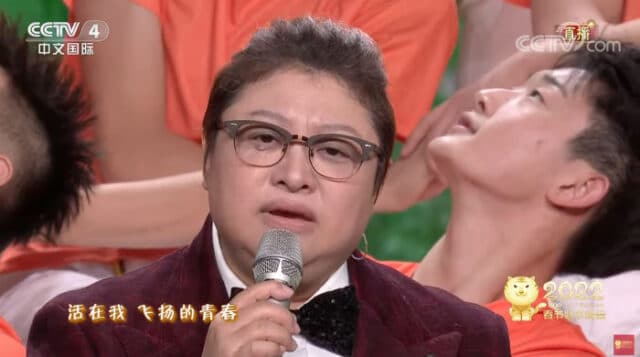
——–
Peking Opera
Jan 31 21:45
Every year you’ll see a Peking Opera act passing by during the Gala. This year, it is a mix of martial art acts together with singing. The performers are from all generations, from those born in the 1930s to those born in the early 2000s.
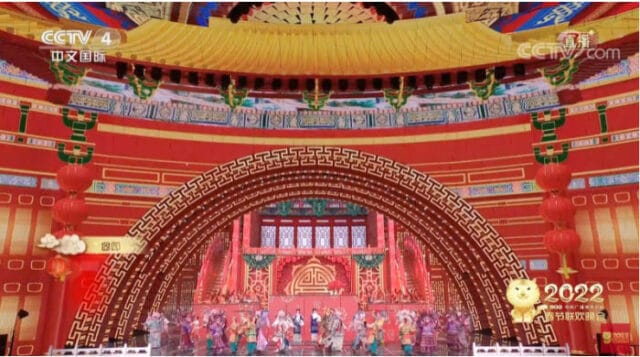
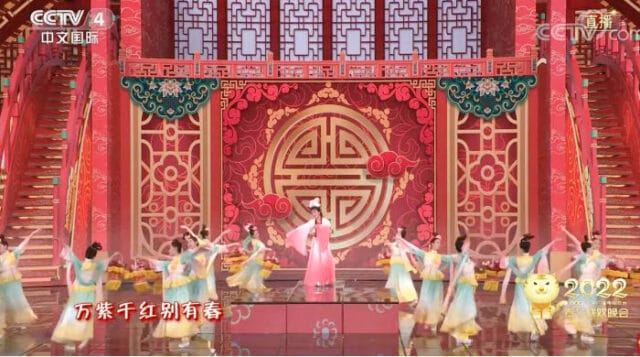
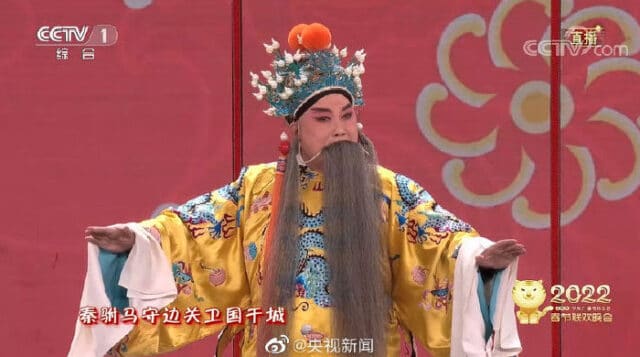
Link to this performance here.
——–
About that Sweater..
Jan 31 21:47
The sweater worn in the ‘debt dodger’ comic skit earlier tonight might have looked cheap, it’s actually $260! Gala viewers who liked the sweater can buy it online straight away.
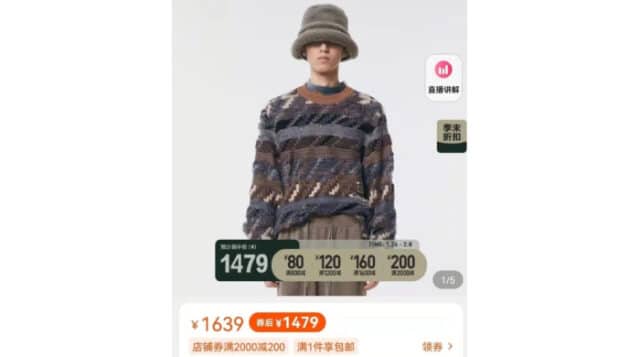
——–
Grabbing Red Envelopes with JD
Jan 31 21:48
After the Gala partnered with Tencent, Kuaishou, and Baidu in previous years, they’ve now partnered up with e-commerce giant JD.com. Throughout the show, you’ll see various ‘media moments’ during which viewers can ‘catch’ red envelopes.
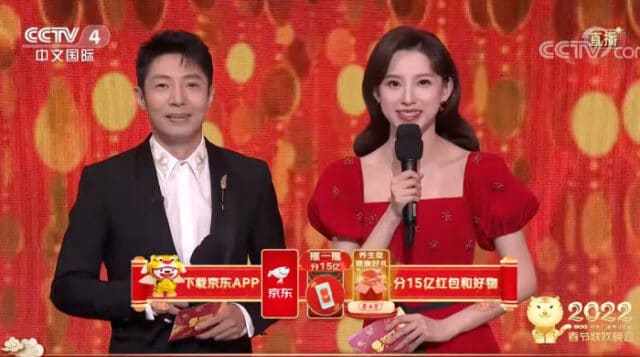
Actually, the Gala became especially linked to social media it first featured this kind of exchange of ‘hongbao’, red envelopes with money, which is a Chinese New Year’s tradition. In 2015, for the first time, viewers were able to receive virtual ‘hongbao’ as part of a cooperation between CCTV and WeChat. WeChat users shook their phones 11 billion times that night in order to ‘grab’ the money. These kinds of campaigns drew in much more young viewers – the Gala was previously viewed as something for older audiences – although it still might be, social media has helped get the younger viewers involved, too.
——–
“Sending Out Red Envelopes”
Jan 31 21:57
This is another comical sketch, titled Sending Out Red Envelopes (发红包) featuring some well-known comedians including Jia Bing.
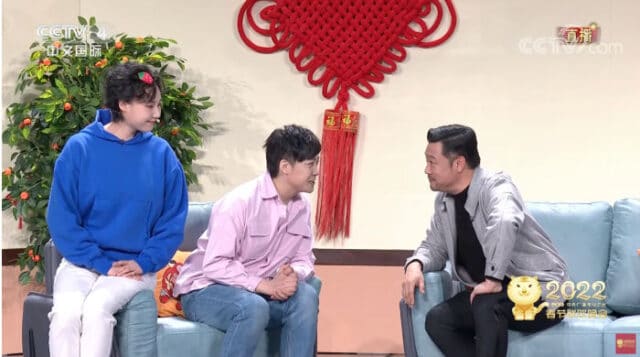
This skit is another one focused on money: “You’d almost think that the director still needs to get his money back from someone,” some Weibo users are joking, since money seems to come up a lot as a theme in tonight’s comedy.
——–
Happy Vibes
Jan 31 22:09
Next up, there are some happy vibes with Da Zhangwei (大张伟) and Wang Mian (王勉) in this “music talk show” (“音乐脱口秀”) segment.
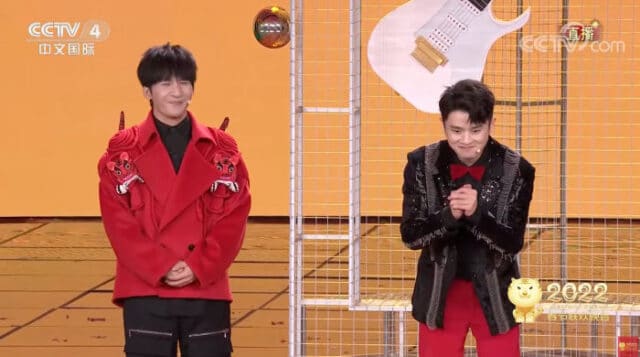
You might know Da Zhangwei as ‘Wowkie Zhang’ from the Sunshine Rainbow White Pony song. Attention was drawn to the song in the West when internet users thought that the chorus of the song, where Wowkie Zhang repeats the lyrics “nèi nèi ge nèi nèi nèi ge nèi ge nèi nèi,” was racist. But ‘nèi ge‘ is actually a filler word in Chinese (like ‘like’).
Link to this performance here.
——–
Magic Act
Jan 31 22:21
Usually, you’d expect magic performances to come a bit later in the show, but here we are with Chinese magician Daly Tang (邓男子). We’re halfway through the show.
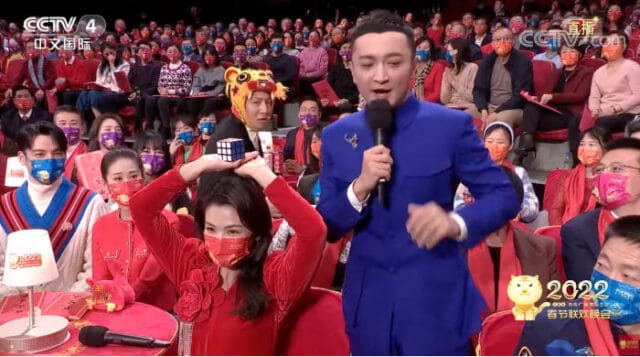
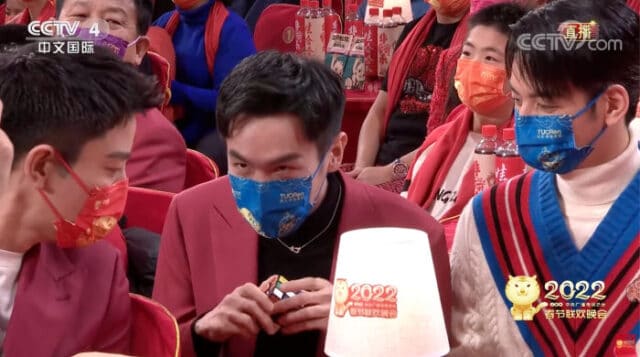
This act is not received well on social media, with many saying this can’t even be called magic. Chinese actress being used as a ‘prop’ for the act is trending at this time.
Link to this performance here.
——–
乳虎啸春
Jan 31 22:25
There are martial arts at the festival every year, but this performance is a bit special since it combines comedy and martial arts and also is performed by many younger performers from the Henan Shaolin Tugou School of Martial Arts.
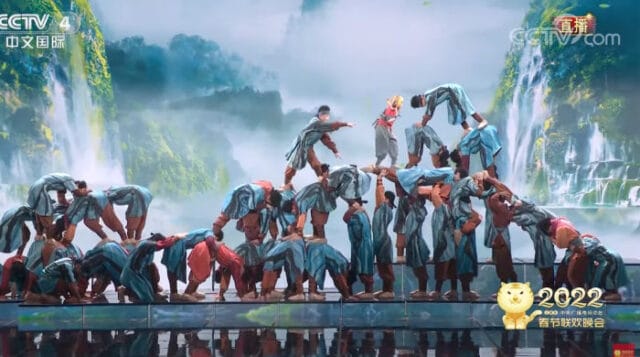
It is also a special performance because it combines martial arts with humor, whereas these kinds of performances are usually more serious.
According to one of the coaches of the children, the students practiced their facial expressions in the mirror every day as part of their homework. They also looked at film and television materials to learn from.
Link to this performance on YouTube here.
——–
“Happy Dialect”
Jan 31 22:39
This ‘crosstalk’ performance features xiangsheng actors Jiang Kun and Dai Zhicheng. Xiangsheng (相声) or crosstalk is a traditional Chinese comedic performance that involves a dialogue between two performers, using rich language and many puns.
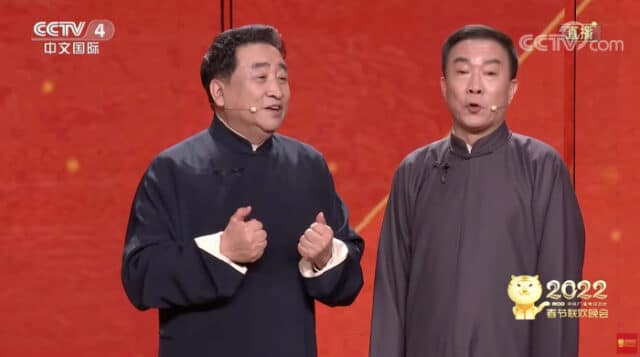
Meanwhile, presenter Sa Beining is going viral for his peculiar role in the magic act.

Link to this performance here.
——–
“Star Dreams”
Jan 31 22:45
Every year, there’s always one song dedicated to children and it’s often all over the place. In the past, we’ve seen dancing panda’s and dogs, flowers, and even swinging broccoli on stage. Here we see the Air Force Blue Sky Children’s Art Troupe on stage together with Zhao Yixi (赵芸熙) in this beautiful space-themed performance.
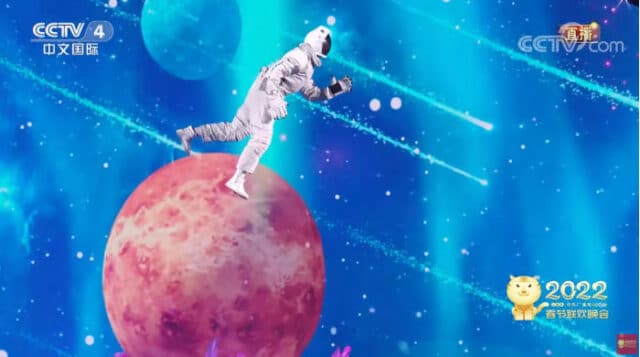

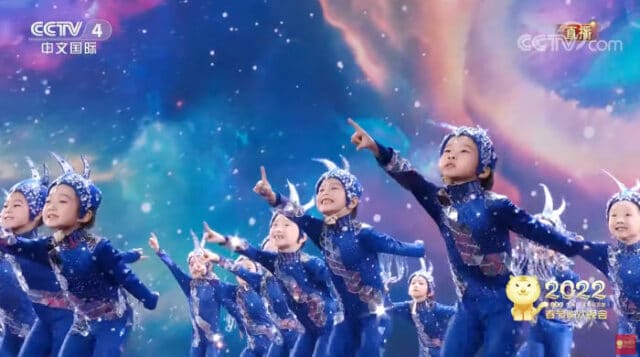
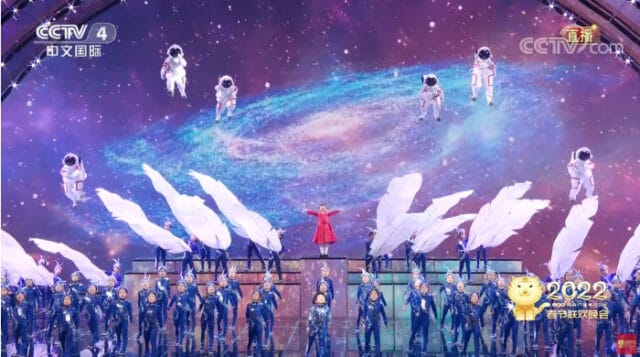
The kids’ performance “Star Dreams” also contained a special surprise: the little girl showing up at the end is actually the little daughter of female Chinese astronaut Wang Yaping, who is now on the 6-month Shenzhou-13 mission. She asked her mum to bring her back a star.
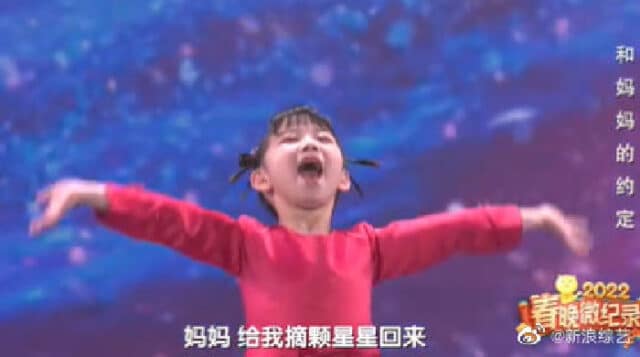
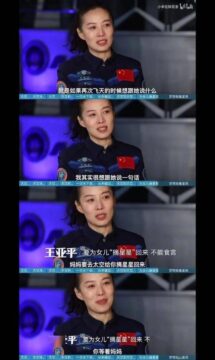
Link to this performance on YouTube here.
——–
Yunnan Group Dance 摆出一个春天
Jan 31 22:48
This performance showcases the traditional folk dances from Lancang Lahu Autonomous County, located in the southwestern part of Yunnan province (not too far from the Myanmar border).
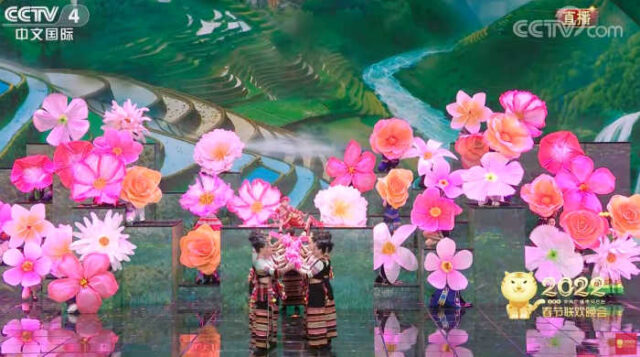
Link to this performance on YouTube here.
——–
“Rest Area” Outside of the Hospital
Jan 31 23:00
Another comical skit, titled ‘Rest Area Story’ (休息区的故事), is performed by Guo Donglin (郭冬临), Shao Feng (邵峰), Han Yunyun (韩云云), Huang Yang (黄杨), Jiang Lilin (姜力琳), Zhang Dabao (张大宝).
Guo Donglin is notable for performing xiangsheng and sketch comedy and has appeared at the Gala for many years.
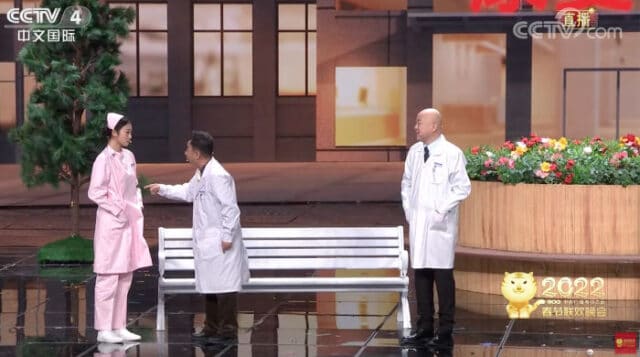
In this performance, we see a couple, who are both working on the frontlines of the epidemic, arguing together.
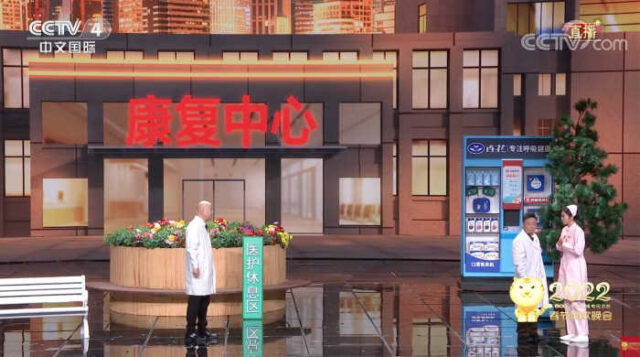
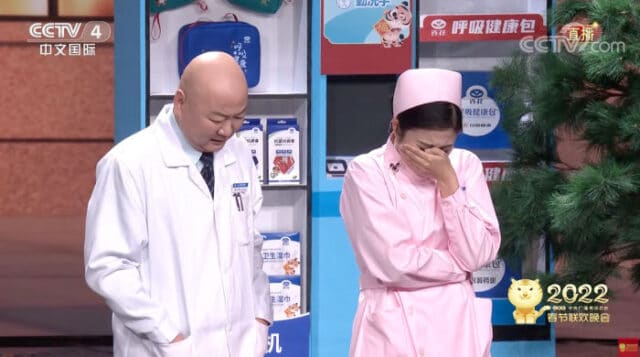
"Mask-wearing me when I say hi to my friends but they don't recognize me" pic.twitter.com/JmJiZpuWwT
— Manya Koetse (@manyapan) January 31, 2022
Link to this performance on YouTube here.
——–
Sanxingdui Relics Ceremony and Dance
Jan 31 23:14
Chinese director Zhang Guoli is coming on stage now for this special ceremony that is all about the relics that were unearthed in southwest China earlier in 2021. A gold mask dating back over 3,000 years was among hundreds of relics uncovered from a series of sacrificial pits in southwest China. The finds were made at Sanxingdui, a 4.6-square-mile archeological site outside Chengdu.
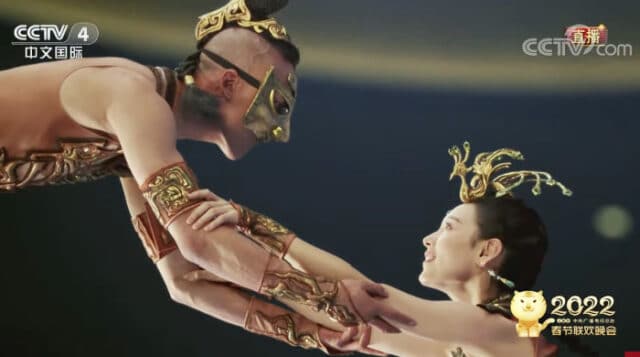
Zhu Fengwei (朱凤伟) and Wang Xi (王西) perform this creative dance performance titled Golden Mask, of course referring to the special artifact found at Sanxingdui.
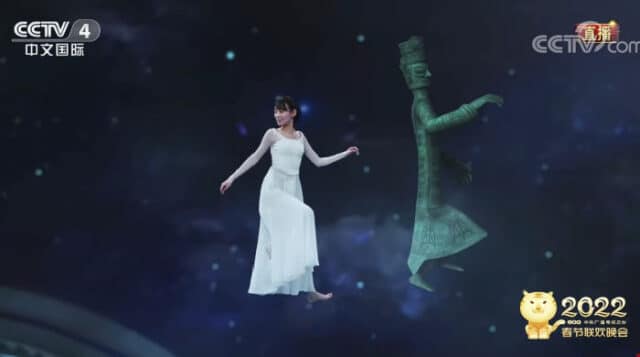
Link to this performance on YouTube here.
——–
ShaLaLaLa Song
Jan 31 23:17
Canto-pop is here! The singers performing this Shalalala song are all established names from Hong Kong. There’s Alan Tan, a big name in the Cantopop scene of the 1980s. There’s Kenny Bee who has been in the entertainment industry for at least three decades. We also see Bennett Pang, Anthony Chan, and Bingo Tso.
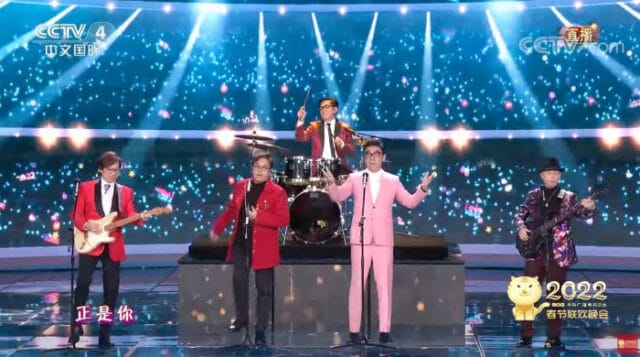
Together, these artists once were in the Hong Kong English pop band The Wynners, which became one of the most popular teen idol groups in Hong Kong during the 1970s.
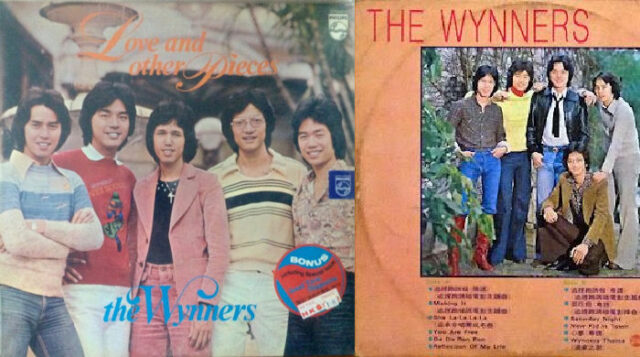
Link to this performance on YouTube here.
——–
True Love Dance
Jan 31 23:22
The China Acrobatic Troupe is on stage to perform the True Love Dance (真爱起舞). Singing are Chinese actors and singers Ren Jialun (任嘉伦), Roy Wang (王源), Victoria Song (宋茜), and Jike Junyi (吉克隽逸).
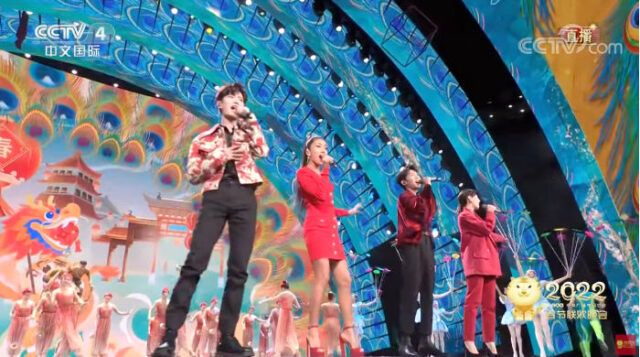
Link to this performance on YouTube here.
——–
Another Xiangsheng
Jan 31 23:33
This xiangsheng or ‘crosstalk’ performance is by Lu Xin and Yu Hao. Crosstalk usually involves two actors with one being the “joker” and the other being the “teaser,” it is all about word jokes and playing with rhythm and language.
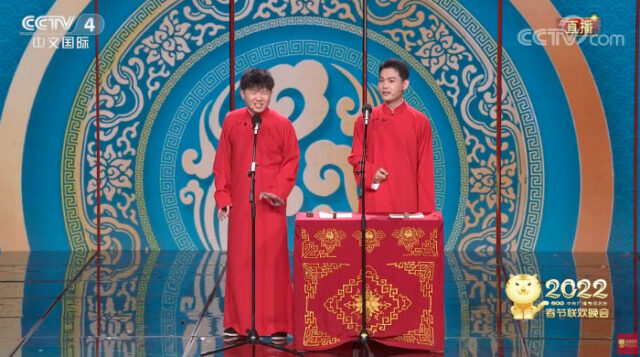
Meanwhile, on Weibo, many netizens are complaining that they don’t find the language performances as funny as before and that they are missing the older performers they grew up seeing on tv.
——–
You are the Gift of My Life
Jan 31 23:38
This song is sung by the renowned Chinese singer and songwriter Liu Huan (刘欢), who is famous for his work within China’s pop music industry. Outside of China, is also known for performing at the 2008 Olympics Ceremony, joined by Sarah Brightman to sing the official song You and Me. Liu actually has a small Olympic pin on his hat as a nod to the Beijing 2008 Olympics.
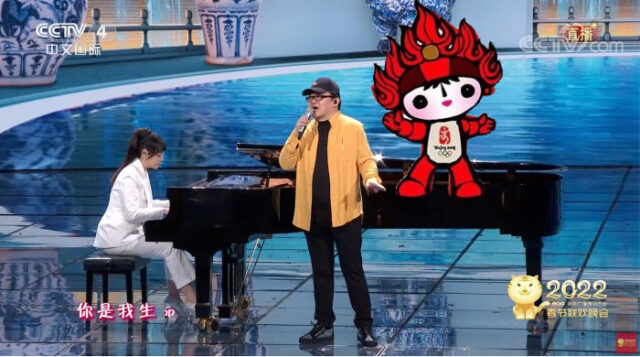
Liu Huan is praised for being down-to-earth, as he's singing at the Gala wearing casual clothes (a pin on his cap is a nod to the 2008 Olympics!) and he didn't even buy a new jacket for the occasion – some Weibo users found this older pic of him wearing the same pic.twitter.com/t5LyjmYoVH
— Manya Koetse (@manyapan) January 31, 2022
Link to this performance on YouTube here.
——–
Our Era
Jan 31 23:40
The song Our Era (我们的时代) is performed by Zhang Ye (张也) and Lü Jihong (吕继宏) who have often sung together at earlier Spring Festivals, mostly singing patriotic songs bringing an ode to China, Chinese people, and China’s landscapes.
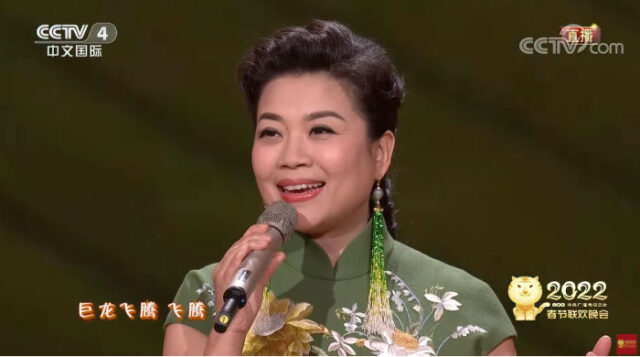
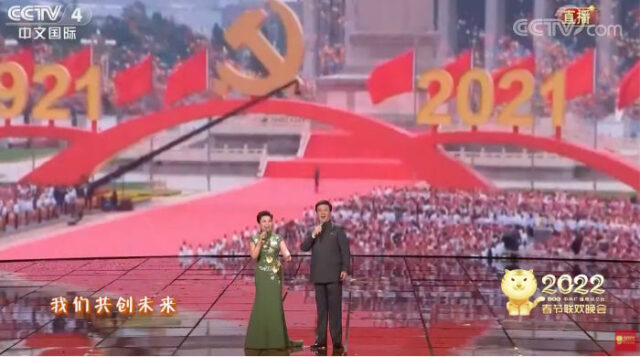

Link to this performance on YouTube here.
——–
Special Segment
Jan 31 23:43
Like every year, this is the part of the show where some ‘exemplary persons’ get honored for their accomplishments. This special segment pays a tribute to recipients of the July 1st Medal, the Party’s highest honor, recognizing exceptional service and contributions to the Party and the country.
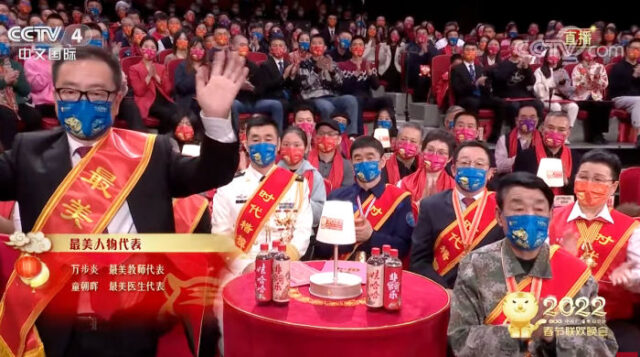
——–
Love Together
Jan 31 23:46
We suddenly find ourselves immersed in an underwater world together with Chinese singer-songwriter Li Ronghao and Taiwanese singer Angela Zhang for the song Love Together (爱在一起).
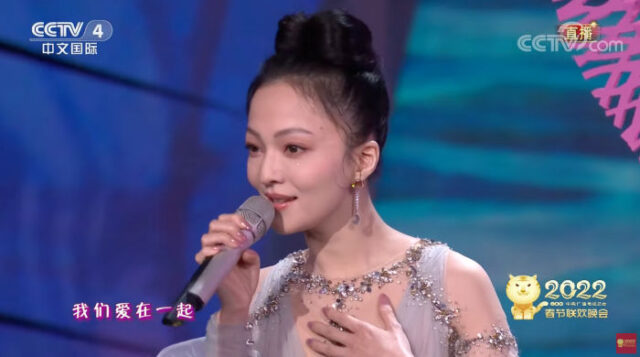
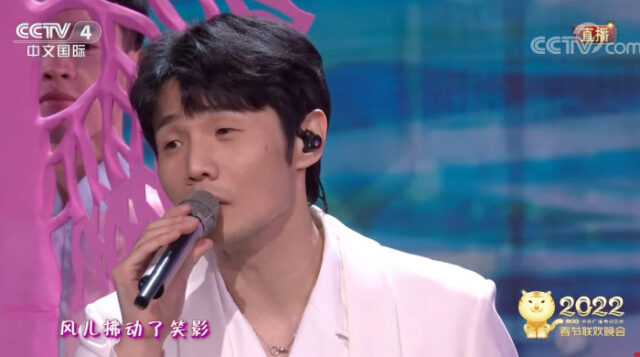
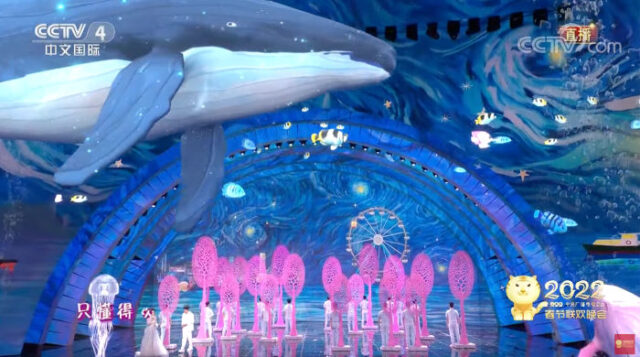
Link to this performance on YouTube here.
——–
Yellow River, Yangtze River
Jan 31 23:52
Mainland China, HK, Macau, and Taiwan are all represented on stage for this song!
This song (黄河 长江) is performed by Chinese top actor and singer Chen Kun (陈坤 , 1979), who is also known as Aloys Chen. Together singing with him are Taiwanese singer Jam Hsiao and Hong Kong rapper/singer/multi-talent Jackson Wang. From Macao there’s the musical artist Sean Pang (Pang Veng-Sam/彭永琛).
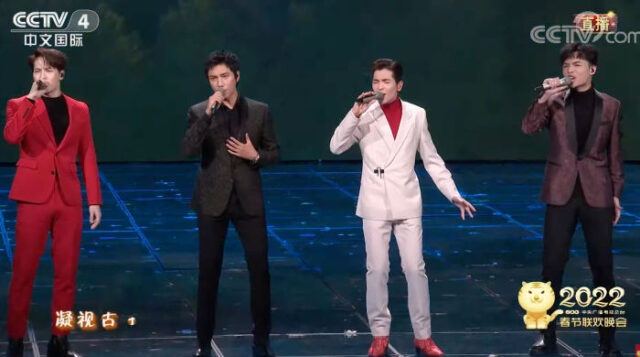
Link to this performance on YouTube here.
——–
The Bells of Spring
Jan 31 23:55
The Bells of Spring (春天的钟声) is a song performed by Gala veteran Sun Nan and the singer Tan Weiwei.
Sun Nan (孙楠) is a famous Chinese Mandopop singer who performed at the Gala multiple times over the past year, including the iconic 2016 performance where he danced together with 540 robots.
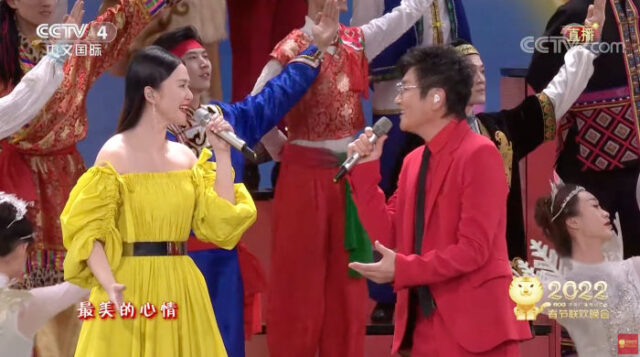
Tan Weiwei (谭维维), also known as Sitar Tan, is a singer from Sichuan who rose to fame when she became a runner-up in the Super Girl talent show. In 2020, she released a noteworthy album titled 3811 which focused on the struggles women in China are facing, with each of the 11 songs on the album telling stories of women from diverse backgrounds.
Link to this performance on YouTube here.
——–
Twelve O’Clock Moment
Jan 31 0:00
Countdown!
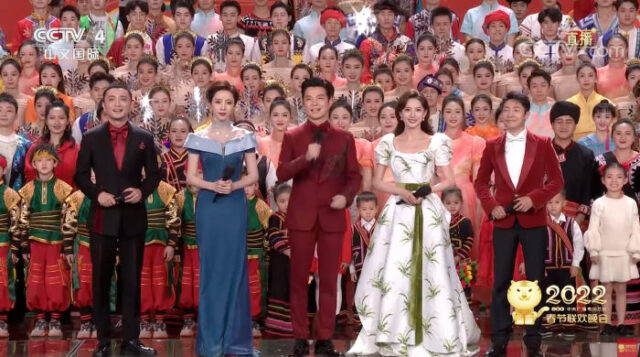
It’s twelve o’clock. Happy New Year, everybody!
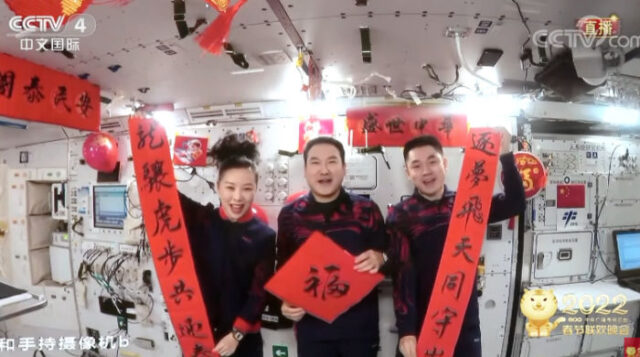
This special moment is celebrated together with Chinese astronauts Zhai Zhigang, Wang Yaping, and Ye Guangfu. The three were sent into China’s space station aboard the Shenzhou-13 spaceship on October 16, 2021, for a six-month stay – the longest ever in-orbit duration for ‘taikonauts.’
——–
Winter Olympics Special
Feb 1 00:09
We just saw Ice and Snow Twinkling in the Chinese Year under the guidance of the renowned conductor Chen Xieyang, who is also Honorary Music Director of Shanghai Symphony Orchestra.
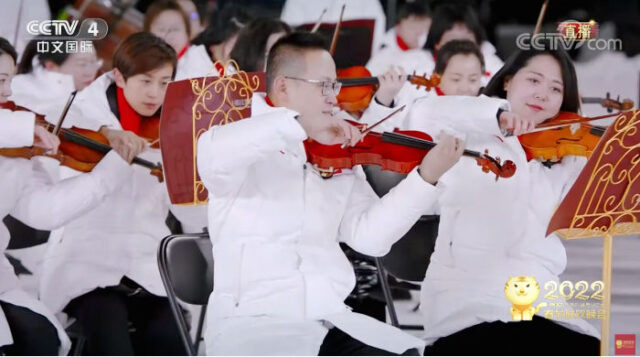
Following were some words from International Olympic Committee (IOC) President Thomas Bach. Last week, the Olympic chief met face-to-face with Xi Jinping as China is getting ready to host the Winter Games.
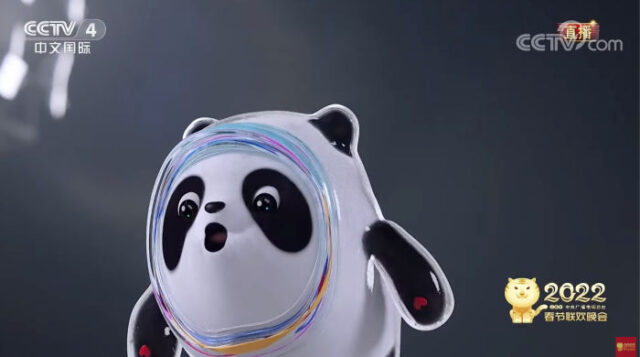
Then this is the official Olympic song Light Up the Dream (点亮梦) performed by baritone Liao Changyong and Hongkong pop diva Coco Lee. On stage with them are 19 foreign hosts of CGTN.
Light Up Your Dreams was released in September 2021 by the Beijing Winter Olympic Organizing Committee as a song meant to communicate positivity and hope (“There’s a miracle waiting for you after the storm”).
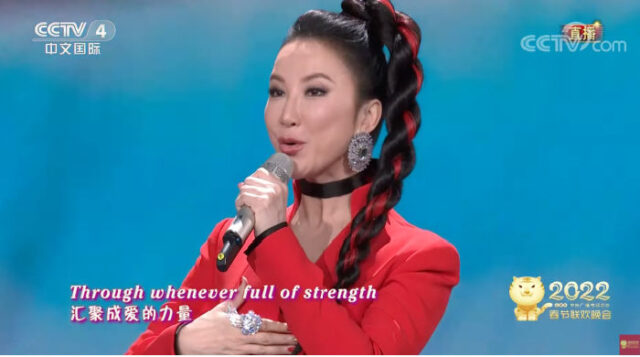
Also performing: China Disabled People’s Performing Art Troupe.
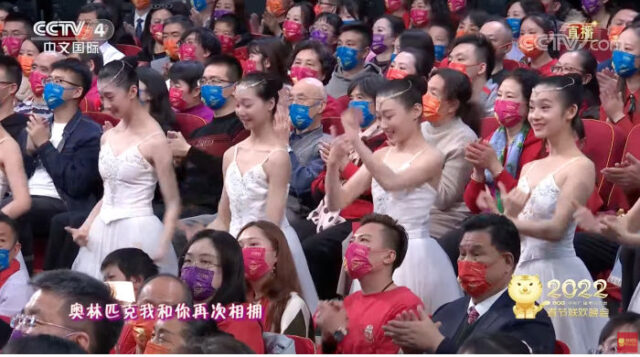
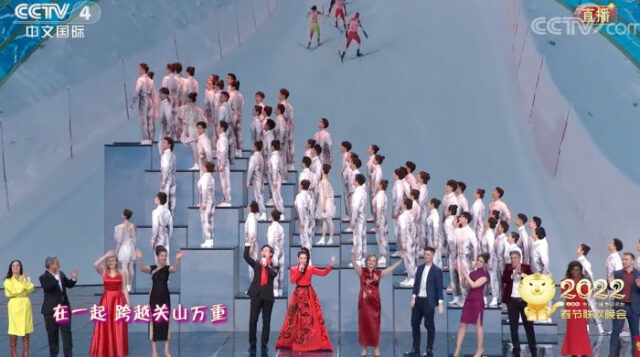
Link to this performance on YouTube here.
——–
Online criticism
Feb 1 00:13
Some online criticism on an earlier short play performed tonight about the hospital staff couple arguing about a spot to go abroad. The husband told the wife not to go because she is female. The online doctor network 丁香园 is now pointing out it’s sexist to say females should not go abroad as people “would be all focusing on how pretty she is instead of getting medical help.”
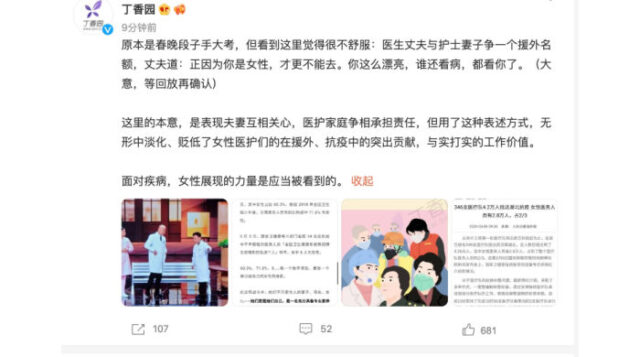
——–
Hotpot Sonata!
Feb 1 00:20
After the Song of the Land we have now switched to Hotpot Sonata (火锅奏鸣曲).
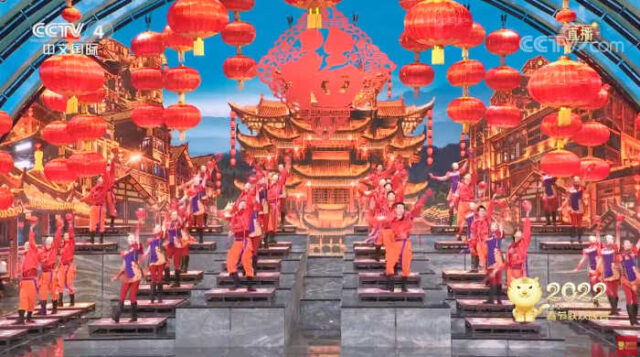
This song is an ode to hotpot! And we love hotpot!
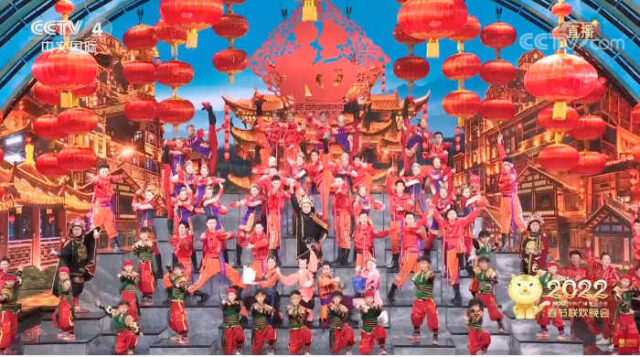
The performance, among others, is by Chongqing Song and Dance Troupe.
Link to this performance on YouTube here.
——–
Creative music, dance, poetry and painting “Reminiscence of the South”
Feb 1 00:23
This song is called Remembering the South (忆江南) and is performed by a male group of older and younger performers, including the 68-year-old Chinese mainland actors Pu Cunxin(濮存昕, 68 years old), Feng Yuanzheng (冯远征, 59 years old), Ding Zhi-Cheng (丁志诚, 58 years old), and the Taiwanese actor Li-Chun Lee (李立群, 69 years old).
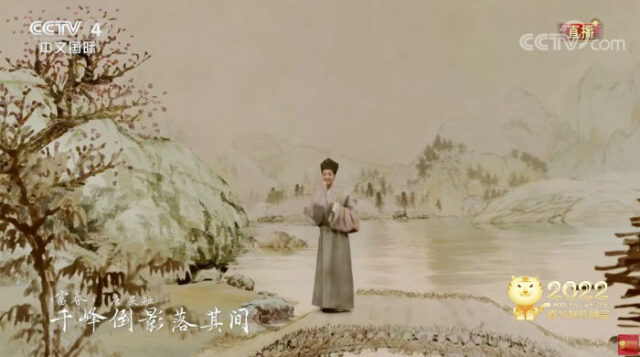
Among the younger singers (1980s/1990s), there’s Ayanga (阿云嘎), Chinese musical theater actor, singer and songwriter of Mongol ethnicity; Taiwanese Mandopop singer Aska Yang (杨宗纬), Chinese singer Shawn Zheng aka Zheng Qiyuan (郑棋元) and the Chinese operatic tenor Cai Chengyu(蔡程昱).
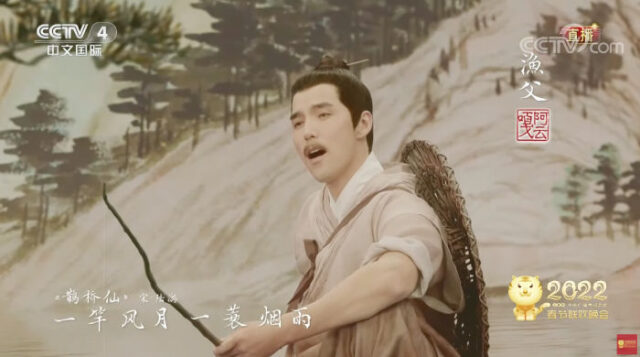
Many on social media find this performance so beautiful that they wonder why it was scheduled so late in the evening.
Link to this performance on YouTube here.
——–
Happy Hour
Feb 1 00:26
Chinese actor Zhu Yilong (朱一龙, 1988) is on stage singing the song Happy Hour (欢乐时光). It is not the first time for the Beijing Film Academy graduate to take part in the show. Last year, he performed together with Jackie Chan in one of the most anticipated acts of the night, which was a performance dedicated to all the health workers during the epidemic.
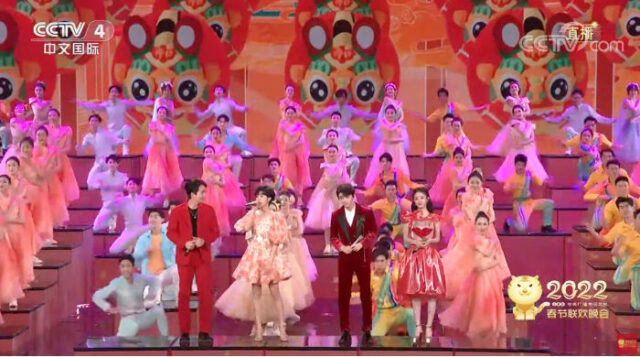
With Zhu there is the “queen of TV ratings”, Chinese actress Zhao Liying (赵丽颖), there’s TFBoys leader Karry Wang aka Wang Junkai (王俊凯), and Yisa Yu aka Yu Kewei (郁可唯).
Dance by Jilin City Song and Dance Troupe, China Post Art Troupe, Shandong Arts Institute, Zhongnan University of Nationalities School of Music and Dance, and the Beijing Modern Music Training Institute.
Link to this performance on YouTube here.
——–
Song “Unforgettable Tonight”
Feb 1 00:23
As always, the last song of tonight is Unforgettable Night (难忘今宵), the traditional closing song of the Spring Festival. The song was composed in 1984 when CCTV was preparing for its second Spring Festival Gala. Chief director Huang Yihe invited Qiao Yu and Wang Ming to write a closing song for the Gala in a simple yet popular style. The lyrics are by Qiao Yu (乔羽), the music is by Wang Ming (王酩).
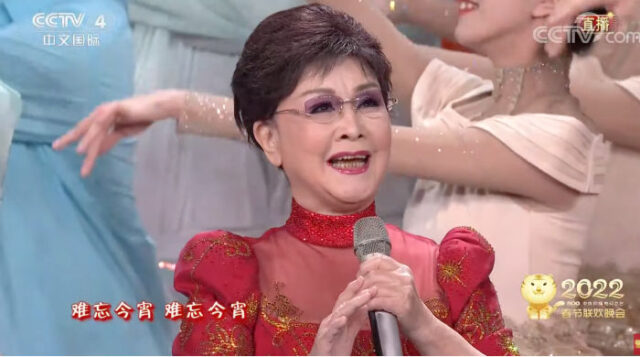
Every year, the song is sung by Li Guyi (李谷一), who became famous with the song Homeland Love (乡恋) around the time of China’s Reform and Opening Up – the singer and her songs are nostalgic for many viewers. Li Guyi also appeared at the very first version of the Gala in 1983 and became the singer that sang the most at the event. She is singing together with Yang Hongji (杨洪基), Huo Yong (霍勇), and Yi Liyuan (伊丽媛).
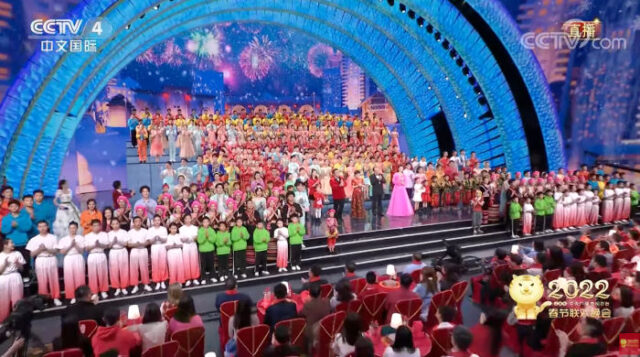
With her on stage are all performers out tonight. It’s a wrap! Thank you for joining us and cheers to the Year of the Tiger.
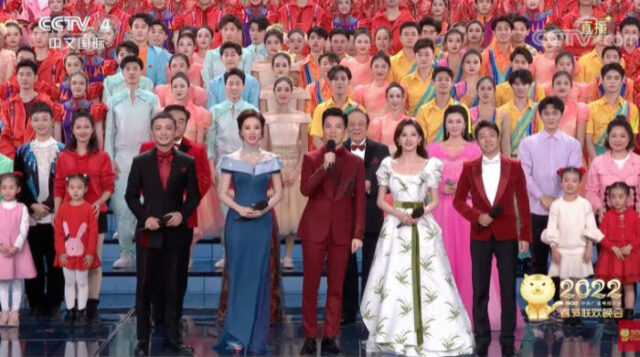
Link to this performance on YouTube here.
By Manya Koetse, together with Miranda Barnes
1 For more on the political and socio-cultural meaning of the Gala, see Gao Yuan, 2012, “Construction of National Identity Through Media Ritual: A Case Study of the CCTV Spring Festival Gala,” Master’s Thesis, Uppsala University, Media & Communication Studies;
Yuan Yan, 2017, “Casting an ‘Outsider’ in the Ritual Center: Two Decades of Performances of ‘Rural Migrants’ in CCTV’s Spring Festival Gala,” Global Media and China 2 (2): 169-182.
Spotted a mistake or want to add something? Please let us know in comments below or email us. First-time commenters, please be patient – we will have to manually approve your comment before it appears.
©2022 Whatsonweibo. All rights reserved. Do not reproduce our content without permission – you can contact us at info@whatsonweibo.com.
Stories that are authored by the What's on Weibo Team are the stories that multiple authors contributed to. Please check the names at the end of the articles to see who the authors are.

China Memes & Viral
Weibo Watch: Going the Wrong Way
About how one delivery driver’s plea for leniency shed light on challenges and struggles faced by millions of food delivery workers, and more must-know trends.
Published
2 weeks agoon
August 22, 2024
PREMIUM NEWSLETTER | ISSUE #35
This week’s newsletter:
◼︎ 1. Editor’s Note – Going the wrong way
◼︎ 2. What’s New and Noteworthy – A closer look at featured stories
◼︎ 3. What’s Trending – Hot highlights
◼︎ 4. What’s Noteworthy – Young woman’s lonely death in rented apartment
◼︎ 6. What’s Popular – Fan Zhendong’s pluche toys
◼︎ 7. What’s Memorable – Ren Zhiqiang’s Weibo exit
◼︎ 8. Weibo Word of the Week – Fandom-ization
Dear Reader,
“Apology! Apology!” Dozens of delivery drivers chanted, standing together in front of Hangzhou’s Xixi Century Square. The group of workers, mostly men, had gathered in front of the complex after learning about an incident that took place just hours earlier.
One of their colleagues, a young delivery driver for the Meituan platform named Wang, had accidentally damaged a fence while trying to enter the complex to deliver a food order on August 12. The security guard stopped him and allegedly demanded 200 yuan ($28) in compensation. Onlookers captured a video showing Wang kneeling before the guard, pleading for leniency. He could not afford the fee nor the kerfuffle—it was peak lunch hour, and he needed to deliver his order on time.

The image that went viral on the afternoon of August 12.
The incident immediately went viral in WeChat groups.1 The image of the delivery driver on his knees, hands in his lap, helplessly looking up at the security guard, resonated with many delivery workers, sparking anger. Members of the delivery community decided to gather at the scene and protest the way their colleague had been treated.
As more delivery drivers arrived, tensions escalated (video). At least twenty police officers, including a specialized police unit, were called in to deescalate the situation, and the security guard was rushed away for his own safety.
That same night, local authorities issued a notification about the incident, urging people to remain calm and show more tolerance and understanding during these blazing hot summer days.
But the simmering tension beneath the surface runs deeper than just the summer heat.
In recent years, many viral videos have captured the hardships faced by Chinese food delivery workers, who endure scorching heat, heavy rain, and thunderstorms to deliver their orders. On August 21, a delivery driver in Pingyang collapsed while picking up a food order at a restaurant but insisted on completing the delivery (he was eventually taken to the hospital by ambulance). Other videos on platforms like Douyin show delivery riders breaking down during work.
The pressure they face is real, and the work they do is intense. China’s main food delivery platforms, Meituan and Ele.me, backed by tech giants Tencent and Alibaba, employ a combined 10 million delivery drivers. Their daily work is monitored by algorithmic management tools. The workload is high, the overwork is severe, the income is low, and the conditions are often unsafe.
Most of these workers are lower-educated migrant workers from rural areas who were already in vulnerable positions before taking these jobs. They face challenges such as limited job opportunities, inadequate medical care, poor nutrition, and sometimes language barriers or social alienation in China’s urban jungle.2 The digital control makes their work stressful—a late order or bad review can cost them income.
Recent studies show that these factors make China’s food delivery drivers highly susceptible to anxiety and depression. One study focusing on urban delivery drivers in Shanghai found that 46% of the drivers surveyed reported anxiety symptoms, and 18% experienced depression.3
While the recent Hangzhou incident and other viral moments have drawn attention to the stressful working conditions and weak social status of China’s food delivery workers, a new Chinese movie presents a different perspective on the gig economy.

One of the movie posters for Upstream (2024).
Upstream “逆行人生” (Nìxíng Rénshēng), a movie by director and star actor Xu Zheng (徐峥), was released on August 9. The story revolves around former programmer Gao Zhilei—played by Xu himself—who loses his job and savings. To support his family and ill father, he takes up a job as a delivery worker to survive.
The Chinese title of the movie, 逆行人生, translates to “a life against the current.” The term 逆行 (nìxíng) literally means ‘to go the wrong way’ or ‘to move in the opposite direction,’ and it has been translated as ‘upstream’ in this case. Since early 2020, Chinese state media have used the term 逆行者 nìxíngzhě, “those going against the tide” to refer to frontline workers and everyday heroes who made significant contributions or sacrifices for society, particularly during the pandemic or in emergencies such as forest fires.
Although Upstream does highlight some of the struggles faced by Chinese gig workers, it is largely a feel-good movie that avoids a deeper exploration of the marginalized status and precarious work conditions of gig workers. The title and story align with the narrative promoted by official media about China’s food delivery workers, especially during the pandemic when their work was extra demanding. Instead of lobbying for better labor conditions, they are praised as heroic and altruistic; as noble national heroes who act for the greater good. As one driver quoted in a study by Hui Huang put it: “They treat us as heroes in the media, but as slaves in reality.”4
This sentiment also plays a role in the public’s reception of Upstream, as discussed in a recent article by Sixth Tone. Many feel that the film exploits the struggles of China’s gig workers for entertainment and profit rather than genuinely advocating for their rights and well-being. Turning such harsh realities into a feel-good narrative is seen by some as “the wrong way” rather than “upstream.” Some have even described it as “rich people acting poor and making the poor pay for it.”
One Zhihu user placed the actual film poster next to an alternative version featuring delivery driver Wang in a vulnerable, knee-down position, which powerfully symbolizes how many delivery drivers perceive their weak status in society. The official poster says, “August 9 – auspicious/timely delivery,” while the alternative poster states, “August 12 – delivery not possible.”

Photo uploaded by 芒果味跃迁引擎 on Zhihu
However, there is an upside to the heightened attention on China’s food delivery workers: increased awareness. For example, the absurdity of relying on algorithms for their work is now sparking important discussions.
Delivery algorithms put pressure on riders by calculating precise delivery times based on ideal conditions, leaving little room for traffic delays, staircases, extreme weather, or restaurant preparation times. Riders can get caught in “algorithm traps” (算法陷阱) because the faster they work, the stricter the algorithm tightens delivery windows, and they may face penalties or reduced earnings if they fail to meet the expected times.
The fact that, through Upstream and the Hangzhou incident, people are now acknowledging the pressure that Meituan and Ele.me drivers face under such digital systems is already a big improvement from 2019, when debates centered on whether or not you should say “thank you” to acknowledge the service provided by delivery drivers.
“Maybe some parts of this film don’t fully connect with reality,” author Yan Lingyang (晏凌羊) wrote on Weibo about Upstream: “But under the current system, I think it’s already quite daring. It reflects various issues such as the economic downturn, housing bubbles, corporate burnout [involution], low wages for grassroots workers, lack of rights protection, and algorithm traps.”
Chinese blogger Cui Zijian (崔紫剑) recently also spoke out against the exploitation of drivers by platform companies, arguing that algorithms should be improved and suggesting that delivery riders be included in unions.
While the reception of Upstream and the Hangzhou delivery driver protest might seem to indicate that things are going the wrong way, the increased awareness actually points in the right direction—toward greater understanding of the challenging situation faced by millions of workers.
I’d love to dive deeper into topics such as these that are so relevant in everyday society and show how digital platforms impact the lives of people. Since I’m always reporting the latest trends, it often leaves little room for the more in-depth articles and overviews I’d love to write for you about the issues behind China’s hot topics & tech developments. Because of this, I’ve decided to gradually shift my focus toward deeper dives instead of shorter trend articles for What’s on Weibo. I’ll still provide timely updates on the latest trends through the Weibo Watch newsletter. I’m currently brainstorming how to make this transition, and I’ll keep you involved as I work on continuing to deliver insightful content. Finding the right balance between covering current trends and providing more contextual analyses can be challenging, but I can’t complain—thankfully, no algorithms are chasing me.
Miranda Barnes has contributed to the compilation and interpretation of the topics featured in this week’s newsletter. Ruixin Zhang has authored the insightful fan culture article, and contributed to the word of the week. As always, if you have any observations or ideas you’d like to share, please don’t hesitate to reach out to me.
Best,
Manya Koetse
(@manyapan)
1 The initial story that went viral in WeChat groups (links of screenshots) claimed that the delivery driver was a woman, and that the security guard had forced her to kneel. This detail intensified the outrage. However, it was later revealed that the driver was actually a thin, male worker who knelt voluntarily, in hopes of speeding up the process.
2 See Peng, Yuxun, et al., “Status and Determinants of Symptoms of Anxiety and Depression among Food Delivery Drivers in Shanghai, China,” International Journal of Environmental Research and Public Health 19, no. 20 (2022): 1; and Hui Huang, “Riders on the Storm: Amplified Platform Precarity and the Impact of COVID-19 on Online Food-delivery Drivers in China,” Journal of Contemporary China 31, no. 135 (2022): 351, 363.
3 See Peng, Yuxun, et al., “Status and Determinants of Symptoms of Anxiety and Depression among Food Delivery Drivers in Shanghai, China,” International Journal of Environmental Research and Public Health 19, no. 20 (2022): 10.
4 See Huang Hui, “Riders on the Storm: Amplified Platform Precarity and the Impact of COVID-19 on Online Food-delivery Drivers in China,” Journal of Contemporary China 31, no. 135 (2022): 363.
What’s New

Ping Pong Fandom | The table tennis final between Chen Meng and Sun Yingsha in Paris exposed troubling fan dynamics, sparking discussions on the clash between fandom culture & the Olympic spirit. Read our latest on the influence of fandom culture in Chinese table tennis 🏓 🔗

The Big Olympic File | Before the Paralympics will start on August 28, time to reflect on what happened during the Olympics. We reported and wrapped it up! Capturing all the must-know medals and online discussions happening on the sidelines of the Olympics, here’s the What’s on Weibo China at Paris 2024 Olympic File.

Medals and Memes | The 2024 Paris Olympics captivated Chinese social media, not just for the gold medal victories but also for the many moments that unfolded on the sidelines. Here are the 10 most popular ones.

The Human Bone Controversy | Chinese online media was flooded with 404 errors earlier this month as many of the articles published about the human bone scandal—where the Chinese company Shanxi Aorui illegally acquired thousands of corpses to produce bone graft materials sold to hospitals—were taken offline. From 2015-2023, Shanxi Aorui forged body donation registration forms and other documents to purchase corpses from hospitals, funeral homes and crematoriums to produce bone implant materials sold to hospitals.
What’s Trending
🐒 Black Myth Wukong
A Chinese game that has been in development for over four years is top trending on Weibo this week. More than that: it’s a national sensation. Black Myth: Wukong (黑神话悟空) was officially released on August 20, surpassing all expectations. Within an hour of its release, it topped the “Most Played” list on Steam, with over 2 million concurrent players.
Developed by Game Science, a startup founded by former Tencent employees, Black Myth: Wukong draws inspiration from the classic Chinese novel Journey to the West. This epic tale, filled with heroes and demons, follows the supernatural monkey Sun Wukong as he accompanies the Tang dynasty monk Xuanzang on a pilgrimage to India to obtain Buddhist sūtras (holy scriptures). The game focuses on Sun Wukong’s story after this journey. Black Myth: Wukong has been such a massive success that anything associated with it is also going viral—a merchandise collaboration with Luckin Coffee sold out instantly.
🥇 Olympic Heroes Hailed at Home
China’s Olympic champions, including Quan Hongchan (全红婵), who we also discussed in our last newsletter, have received warm welcomes home as their hometowns were transformed into temporary pilgrimage sites, complete with medal ceremonies and huge posters. There have been many touching moments during the champions’ return. For example, Boxing Gold medalist Wu Yu jumped into her mom’s arms and cried like a little kid after returning from her Paris adventure.
In addition to the warm receptions in their hometowns, the champions were also honored in Beijing at the Great Hall of the People, where Xi Jinping met with the athletes on August 20 and praised them for their performance and sportsmanship throughout the Paris Games. A related hashtag has garnered 360 million views on Weibo ( #中国体育代表团总结大会举行#)
🚨 Magic Carpet Ride Gone Wrong
The “magic carpet ride” at the popular Detian Waterfall scenic area in Guangxi’s Chongzuo drew significant attention on social media earlier this month after a malfunction led to tragic consequences. This attraction, designed to transport visitors up the mountain as they sit backward on a moving belt, suddenly malfunctioned on August 10, causing passengers to slide uncontrollably downwards (here you can see how the attraction normally operates).
The accident resulted in one tourist’s death and injuries to 60 others. A joint investigation team was established to determine the cause of the incident. Preliminary findings suggest that a steel buckle at the belt’s joint broke, causing the belt to rapidly slide downward. With passengers spaced about a meter apart on the conveyor belt, the sudden movement led to collisions, with some individuals being crushed, particularly at the lower end. Those responsible for the attraction’s operation and maintenance have been detained in accordance with the law for their roles in the incident, which will be further investigated.
🍵 Eileen Gu Controversy
Whether it’s her athletic career or personal life, Eileen Gu (谷爱凌) always seems to find herself trending in China. The American-born freestyle skier and gold medalist who represented China at the 2022 Beijing Olympics sparked discussions during the Paris Olympics due to her connection with Léon Marchand, the renowned French Olympic swimmer. Marchand faced significant backlash on Chinese social media after being accused of ignoring a handshake from Team China’s coach Zhu Zhigen (朱志根). A brief video of the incident went viral, showing the Chinese coach approaching Marchand to congratulate him, only for Marchand to seemingly ignore him and walk away.
Amid the controversy, netizens noticed that Gu, who had previously interacted with Marchand online, deleted her comments on his Instagram, including a compliment on his latest Olympic victory (“incredible”) (#谷爱凌删了给马尔尚的所有ins评论#). However, when videos surfaced of Gu dancing closely with Marchand, she was accused of being two-faced or insincere. While some initially saw her deletion of the interactions as a patriotic gesture, many now believe she was simply being opportunistic.
But Gu is clapping back at her haters, suggesting that she can never please everyone. When someone called her out for being “a traitor” to her country, Gu reportedly replied, “Which one?” The issue of Gu’s nationality has been a somewhat sensitive topic since she first represented China, with many questioning whether she holds a Chinese or American passport (as China does not recognize dual nationality). Gu’s previous statement, “I’m American when in the US and Chinese when in China,” has also triggered dissatisfaction among Chinese audiences. On Instagram, she has now confronted her haters: “In the past five years, I’ve won 39 medals representing China and spoken out for China and women on the world stage. What have the haters done for the country?”
💍 New Marriage Rules
A revised draft regulation on marriage registration introduced by China’s Ministry of Civil Affairs last week has sparked significant online discussion. One notable change is that couples will no longer need their hukou, or household register, to get married. Traditionally, this document is often held by parents, meaning that those who wish to marry had to obtain it—essentially seeking parental approval. By removing this requirement, the process is simplified, giving individuals more freedom to marry, even if their parents disagree.
However, the draft regulation is drawing criticism, primarily due to the inclusion of a 30-day cooling-off period for divorce. This cooling-off period (“冷静期”) allows either party to withdraw their divorce application within 30 days of filing. Although introduced in a draft as early as 2018, it continues to generate debate. Many feel that while the revision appears to grant more freedom in marriage, it restricts the freedom to divorce in a timely manner. Some say this is like a “loose entry, strict exit” (宽进严出) policy, similar to Chinese university admissions. One popular comment called it “fake freedom.” The draft regulation is open for public feedback until September 11.
🚴 Discussions over Cycling Boy’s Death
A tragic incident in Hebei has sparked significant online discussions. In Rongcheng County, an eleven-year-old boy who was cycling with his father in a group of cyclists fell down and was run over by a car coming from the opposite direction. A dashcam video captured the group riding in the middle of the road, leaving the oncoming vehicle with little room or time to avoid the collision. The boy succumbed to his injuries shortly after the accident.
The incident has led to broader debates about the father’s responsibility. According to road safety laws, the eleven-year-old should not have been cycling on a public road, especially not in the middle of it. The situation is further complicated by reports that people had previously warned the father about the dangers of bringing his young son on high-speed cycling trips, warnings which he allegedly ignored. Although the father initially attempted to shift the blame onto the driver for speeding, public opinion has largely condemned him for being irresponsible, with devastating consequences.
🇨🇳 Chinese Flag Controversy
A hotel in Paris, part of a Taiwanese chain, became the center of online attention this August after it failed to include the Chinese flag in its Olympic-themed decorations. The issue was brought to light by a Chinese influencer who posted a video accusing the Evergreen Laurel Hotel (长荣桂冠酒店) of refusing to display the Chinese flag, even after the influencer offered to provide one. The incident sparked significant backlash, leading domestic travel platforms like Ctrip and Meituan to delist the hotel’s booking options, including those at its Shanghai location. The hotel eventually issued an apology, but many netizens found it too vague, as it did not directly address the flag incident, instead focusing on general dissatisfaction with their decorations. The Chinese Embassy in France has since commented on the issue, expressing support for Chinese people, both at home and abroad, in their efforts to “remain united and uphold patriotic values.”
What’s Noteworthy

The WeChat account Zhenguan (贞观) reported on August 16 about a tragic incident involving a 33-year-old woman from a small, impoverished village in Ningxia who died alone in her rented 30th-floor apartment in Xi’an. Her body was not discovered for a long time, and by the time it was found, it had decomposed to the point of being unrecognizable. In the article, titled “A Women From Out of Town Died in the Apartment I Rented Out” (“一个外地女孩,死在了我出租的公寓”), which has since been deleted, a landlord shares their story of how they discovered the single young woman had died inside the studio apartment. The article paints a picture of a once-bright rural girl who became disillusioned as the competitive educational system and the pressures of city life crushed her spirit. The woman, who depended on her family’s financial support, hadn’t ordered or cooked any food for nearly twenty days since she was last seen in May, suggesting she most likely starved to death in her apartment.
The article quickly went viral over the weekend. The incident, which allegedly took place during the summer, resonated with people as they began filling in the gaps of the story with their own interpretations. They felt for the woman, who had worked hard in life but had found herself unable to live up to expectations. Some saw the young woman’s story as a tragic reflection of the struggles in contemporary Chinese society. Some blamed city life, others blamed rural culture. But many also doubted the story’s authenticity.
After Chinese media outlets like Zhengzai Xinwen (正在新闻) began investigating the matter, it was revealed that some details in the story were inaccurate. The incident did not occur in Xi’an but in Xianyang. People from the woman’s hometown mentioned that she was socially withdrawn and may have struggled with mental health issues, though she was never formally diagnosed. Local police did confirm that the incident is real and that it is still under investigation by a local branch of the Xianyang Public Security Bureau. Regardless of the exact circumstances, the woman’s story has struck a chord, with one popular comment on Weibo stating: “There are countless others like her in society who are experiencing the same struggles. No matter what you’re going through, I hope you don’t give up on life.”
What’s Popular

This summer’s Olympic fever in China has been evident across various e-commerce platforms. Whether it was the sudden popularity of Zheng Qinwen’s tennis skirt or the craze over diver Quan Hongchan’s ugly animal slippers, Chinese consumers have eagerly embraced Olympic-themed shopping.
Recognizing the influence of athletes during and after the Olympics, brands have tapped into their potential by launching various collaborations. A particularly successful example is the plush paddles endorsed by Olympic table tennis star Fan Zhendong (樊振东). The 27-year-old national table tennis player, often referred to as the “National Ping Pong God” (国乒男神), not only clinched double gold in Paris but also endorses several brands, including the British Jellycat brand, which created the plush paddle toys.

One popular video shows Fan playing table tennis with the plush paddle toy, which quickly sold out after his Olympic victory. The toy was restocked twice in three days before selling out again. Many commenters praised the toy for being so cute, and in light of Wang Chuqin’s now-famous broken paddle incident, others joked that it’s a good thing the plush paddles are unbreakable.
What’s Memorable

China’s well-known political and social commentator Hu Xijin (胡锡进) has been noticeably absent from Chinese social media for about a month. The former editor-in-chief of the Global Times has not posted on his account since July 27—an extraordinary, unannounced, and unexplained pause from his typically daily social media activity. In light of Hu’s sudden silence, we take a look back eight years into the What’s on Weibo archive, when another social media commentator and real estate tycoon, Ren Zhiqiang (任志强), abruptly went silent, and his account subsequently disappeared.
Weibo Word of the Week

Fan Cultured | Our Weibo word of the week is ‘fan-cultured’ or ‘fandom-ization’ (fànquānhuà 饭圈化). While fànquān 饭圈 literally means “fan circle,” the suffix huà 化 is generally used to indicate a process of transformation or turning into something, similar to the “-ization” suffix in English.
The term fànquānhuà 饭圈化 refers to the recently much-discussed phenomenon where something—often outside the realms of entertainment—receives passionate support from people who begin to form online fan circles around it, changing the dynamics in ways that resemble the relationships between celebrity idols and their fans.
A recent example of something being “fan-cultured” or “fandom-ized” is how fans have started to form extremely strong communities around China’s table tennis stars, defending them as if they were idols. This fan behavior has been criticized by Chinese authorities, who see it as toxic fan culture that goes against the Olympic spirit (read more).
But “fandom-ization” goes beyond sports. There are also strong fan club dynamics surrounding Chinese pandas. Even inanimate objects can become “fan-cultured.” For example, the Little Forklift Truck (小叉车) that was part of the construction of the Huoshenshan emergency specialty field hospital during the early days of the Covid crisis. The construction process was live-streamed, and millions of viewers found the little truck—working tirelessly around the clock—so cute and brave that it became “fan-cultured.”


This is an on-site version of the Weibo Watch newsletter by What’s on Weibo. Missed last week’s newsletter? Find it here. If you are already subscribed to What’s on Weibo but are not yet receiving this newsletter in your inbox, please contact us directly to let us know.
China Arts & Entertainment
The Rising Influence of Fandom Culture in Chinese Table Tennis
The match between Sun Yingsha and Chen Meng in Paris highlighted how the fan culture surrounding Chinese table tennis can clash with the Olympic spirit.
Published
3 weeks agoon
August 16, 2024By
Ruixin Zhang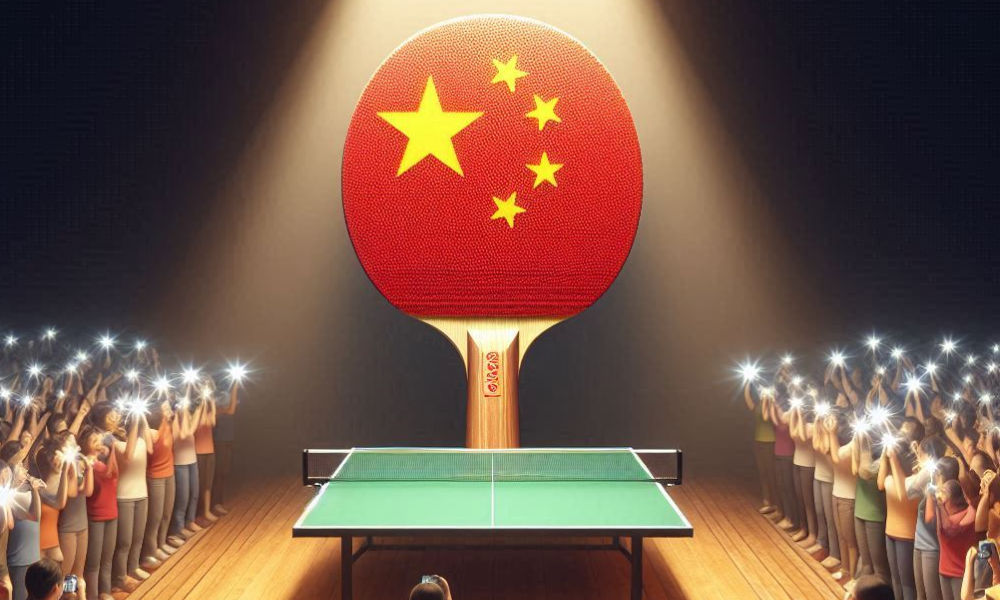
During the Paris Olympics, not a day went by without table tennis making its way onto Weibo’s trending lists. The Chinese table tennis team achieved great success, winning five gold medals and one silver.
However, the women’s singles final on August 3rd, between Chinese champions Chen Meng (陈梦) and Sun Yingsha (孙颖莎), took viewers by surprise due to the unsettling atmosphere. The crowd overwhelmingly supported Sun Yingsha, with little applause for Chen Meng, and some hurled insults at her. Even the coaching staff had stern expressions after Chen’s win.
This bizarre scene sparked heated discussions on Chinese social media, exposing the broader audience to the chaotic and sometimes absurd dynamics within China’s table tennis fandom.
“I welcome fans but reject fandom culture.”
When Sun Yingsha and Chen Meng faced off in the women’s singles final, the medal was destined for ‘Team China’ regardless of the outcome; the match should have been a celebration of Chinese table tennis.
However, the match held significant importance for both Sun and Chen individually. Chen Meng, the defending champion from the previous Olympics, was on the verge of making history by retaining her title. Meanwhile, Sun Yingsha, an emerging star who had already claimed singles titles at the World Cup and World Championships, was aiming to complete a career Grand Slam (World Championships, World Cup, and Olympics).
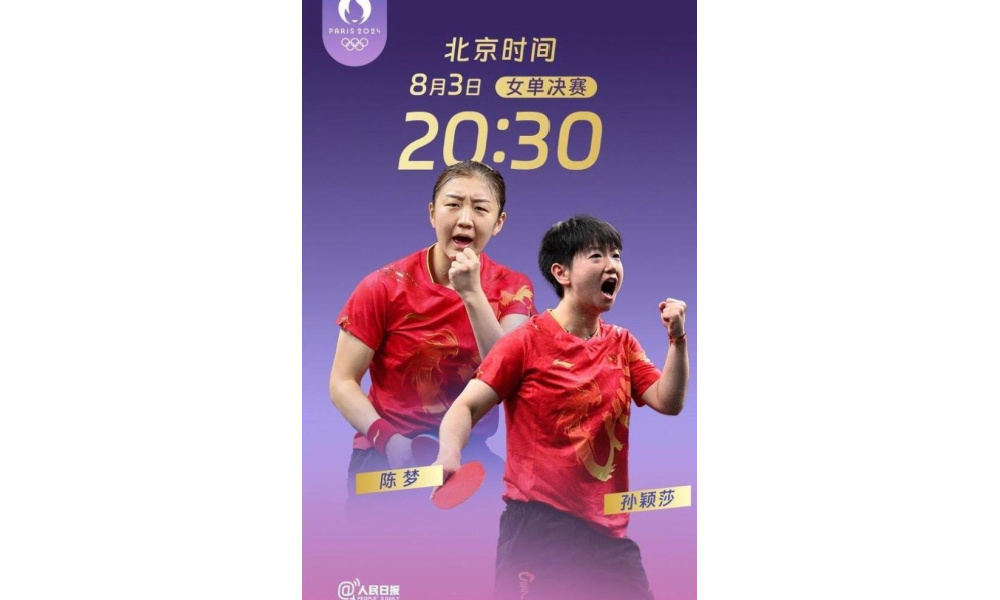
[center] Announcement of the Chen (L) vs Sun (R) match by People’s Daily on social media.[/center]
Sun Yingsha has clearly become a public favorite. On Weibo, the table tennis star ranked among the most beloved athletes in popularity lists.
This favoritism among Chinese table tennis fans was evident at the venue. According to reports from a Chinese audience member, anyone shouting “Go Chen Meng!” (“陈梦加油”) was quickly silenced or booed, while even cheering “Come on China!” (“中国队加油”) was met with ridicule. After Chen Meng’s 4-2 victory, many in the audience expressed their frustration and chanted “refund” during the award ceremony. Meanwhile, social media was flooded with hateful posts cursing Chen for winning the match.
For many who were unfamiliar with the off-court drama, the influence of fandom culture on the Olympics was shocking. However, in the world of Chinese table tennis, such extreme fan behavior has been brewing for some time. Even during the eras of Ma Long (马龙) and Zhang Jike (张继科), there were already fans who would turn against each other and others.
This year’s men’s singles champion, Fan Zhendong (樊振东), had long noticed the growing influence of fandom culture. In recent years, he has repeatedly voiced his discomfort with fan activities like “airport send-offs” and “fan meet-and-greets.” Earlier this year, he took to social media to reveal that he and his loved ones were being harassed by both overzealous fans and haters, and that he was considering legal action. He made it clear: “I welcome fans but reject fandom culture.” His consistent stance against fandom has helped cultivate a relatively rational fan base.
“What has happened to Chinese table tennis fans over the years?”
On Weibo, a blogger (@3号厅检票员工) posed a question that struck a chord with many, garnering over 30,000 likes: “What has happened to Chinese table tennis fans over the years?”
In the comments, many blamed Liu Guoliang (刘国梁) for fueling the fan culture around table tennis. Liu, the first Chinese male player to achieve the Grand Slam, retired in 2002 and then became a coach for the Chinese table tennis team. His coaching career has been highly successful, leading players like Ma Long and Xu Xin (许昕) to numerous championships.
Beyond coaching, Liu has been dedicated to commercializing table tennis. Compared to international tournaments in sports like tennis or golf, the prize money for Chinese table tennis players is only about one-tenth of those sports. Fan Zhendong has publicly stated on Weibo that the prize money for their competitions is too low compared to badminton. Liu believes table tennis has significant untapped commercial potential that has yet to be fully realized.
Under Liu’s leadership, the commercialization of the Chinese table tennis team began after the Rio Olympics, where China won all four gold medals. Viral internet memes like “Zhang Jike, wake up!” (继科你醒醒啊) and “The chubby guy who doesn’t understand the game” (不懂球的胖子) made both the sport and its athletes wildly popular in China.
Seeing the opportunity, Liu quickly increased the team’s exposure, encouraging players to create Weibo accounts, do live streams, star in films, and participate in variety shows. This approach rapidly turned the Chinese table tennis team into a “super influencer” in the Chinese sports world.
While this move has certainly increased the athletes’ visibility, it has also drawn criticism: is this kind of commercialization and celebrity status the right path for China’s table tennis? Successful commercialization requires a mature system for talent selection, team building, and athlete management. However, the selection process in Chinese table tennis remains opaque, the current team-building system shows little promise, and young athletes struggle to break through.
Additionally, athlete management appears amateurish. After watching an interview with Chinese tennis player Zheng Qinwen (郑钦文), a Douban netizen commented that Liu Guoliang’s plan for commercializing athletes is highly unprofessional—relying mainly on their personal charisma to attract attention. The most common criticism is that Liu and the Table Tennis Association should let professionals handle the professional work. Without a solid foundation for commercialization, the current focus on hype and marketing in Chinese table tennis may temporarily boost ticket sales but could ultimately backfire.
“Didn’t you say you want to crack down on fan culture?”
In response to the controversy surrounding the Chen vs. Sun match, the Beijing Daily published an article titled “How Can We Allow Fandom Violence to Disturb the World of Table Tennis?” The article addressed the growing problem of “fandom culture” infiltrating table tennis, a trend that originated in the entertainment world. It highlighted how extreme fan behavior, including online abuse and disruptive actions during matches, harms both the sport and the mental well-being of athletes. While fan enthusiasm is important, the article stressed that it must remain within rational limits.
This article foreshadowed actions taken shortly after. On August 7th, China’s Ministry of Public Security announced an online crackdown on chaotic sports-related fan circles. Social media platforms responded swiftly: Weibo deleted over 12,000 posts and banned more than 300 accounts, while Xiaohongshu, Bilibili, and Migu Video removed over 840,000 posts and banned or muted more than 5,300 accounts.
The campaign against fan culture sparked online debate. Some netizens criticized the official stance on “fandom” as overly simplistic. The Chinese term for “fandom,” 饭圈 (fànquān), contains a homophone for “fan,” referring to enthusiastic supporters of celebrities. In contemporary Chinese discourse, the term is often linked to the idol industry and carries negative, gender-biased connotations, particularly towards “irrational female fans chasing male idols.”
One Weibo post argued that commercialized sports, like football, are inherently tied to fan loyalty, belonging, and exclusivity. Disruptions among fans are not solely due to “fandom” but are often influenced by larger forces, such as capital or authorities. In the table tennis final, even the coaching team’s dissatisfaction with Chen Meng’s victory points to underlying problems beyond fan behavior.
While public backlash against “fandom” in sports often stems from concerns over its toxicity and violence, as blogger Yuyu noted, internal conflicts and power struggles have always existed in competitive sports. Framing these issues solely as “fandom problems” risks oversimplifying the situation and overlooks challenges such as commercialization failures, poor youth development, and internal factionalism within sports teams. The simplistic blame on “fandom culture” is seen by some as a distraction from these real issues, further fueling public frustration.
This public frustration is evident in a 2019 Weibo post and hashtag from People’s Daily. The five-year-old post personified China as a young male idol, promoting patriotism through fandom culture with the slogan “We all have an idol named ‘A Zhong’ (#我们都有一个爱豆名字叫阿中#)” [‘A Zhong’ was used as a nickname to refer to a personified China]. This promotion of ‘China’ as an idol with a 1.4 billion ‘fandom’ resurfaced during the Hong Kong protests.

Hashtag: “We all have an idol named Azhong” [nickname for China]
Now, after state media harshly criticized fandom culture, netizens have revisited the post, bringing it back into the spotlight. Recent comments on the post are filled with sarcasm, highlighting how fandom is apparently embraced when convenient and scapegoated when problems arise.

Post by People’s Daily promoting China as an “idol.”
“Didn’t you say you wanted to crack down on fan culture?” one commenter wondered.
Chen Meng, the Olympic table tennis champion, has also addressed the fan culture surrounding the 2024 Paris matches. She expressed her hope that, in the future, fans will focus more on the athletes’ “fighting spirit” on the field. True sports fans, she suggested, should be able to celebrate when their favorite athlete wins and accept it when they lose. “Because that’s precisely what competitive sports are all about,” she said.
By Ruixin Zhang
edited for clarity by Manya Koetse
Independently reporting China trends for over a decade. Like what we do? Support us and get the story behind the hashtag by subscribing:
Spotted a mistake or want to add something? Please let us know in comments below or email us. First-time commenters, please be patient – we will have to manually approve your comment before it appears.
©2024 Whatsonweibo. All rights reserved. Do not reproduce our content without permission – you can contact us at info@whatsonweibo.com.
Subscribe

Weibo Watch: The Land Rover Woman Controversy Explained

China at the 2024 Paralympics: Golds, Champions, and Trending Moments

“Land Rover Woman” Sparks Outrage: Qingdao Road Rage Incident Goes Viral in China

Fired After Pregnancy Announcement: Court Case Involving Pregnant Employee Sparks Online Debate

Weibo Watch: Going the Wrong Way

Saying Goodbye to “Uncle Wang”: Wang Wenbin Becomes Chinese Ambassador to Cambodia

Hero or Zero? China’s Controversial Math Genius Jiang Ping

A Triumph for “Comrade Trump”: Chinese Social Media Reactions to Trump Rally Shooting

Why Chinese Publishers Are Boycotting the 618 Shopping Festival

Chinese Sun Protection Fashion: Move over Facekini, Here’s the Peek-a-Boo Polo

About Wang Chuqin’s Broken Paddle at Paris 2024

The Beishan Park Stabbings: How the Story Unfolded and Was Censored on Weibo

China’s 2024 Gaokao Triggers Online Discussions on AI

China at Paris 2024 Olympics Trend File: Medals and Moments on Chinese Social Media

Stolen Bodies, Censored Headlines: Shanxi Aorui’s Human Bone Scandal
Get in touch
Would you like to become a contributor, or do you have any tips or suggestions? Get in touch here!
Popular Reads
-

 China Insight4 months ago
China Insight4 months agoThe Tragic Story of “Fat Cat”: How a Chinese Gamer’s Suicide Went Viral
-

 China Music5 months ago
China Music5 months agoThe Chinese Viral TikTok Song Explained (No, It’s Not About Samsung)
-

 China Digital11 months ago
China Digital11 months agoToo Sexy for Weibo? Online Discussions on the Concept of ‘Cābiān’
-

 China Insight6 months ago
China Insight6 months agoThe ‘Two Sessions’ Suggestions: Six Proposals Raising Online Discussions


